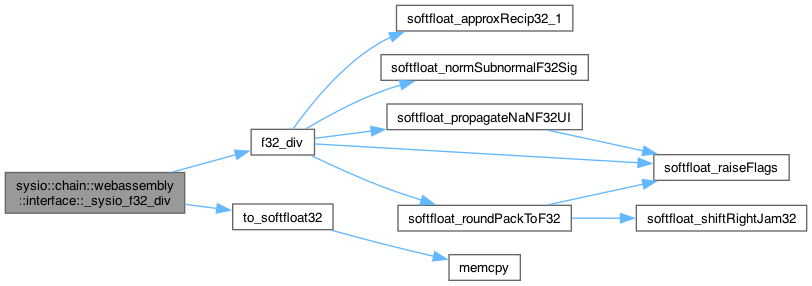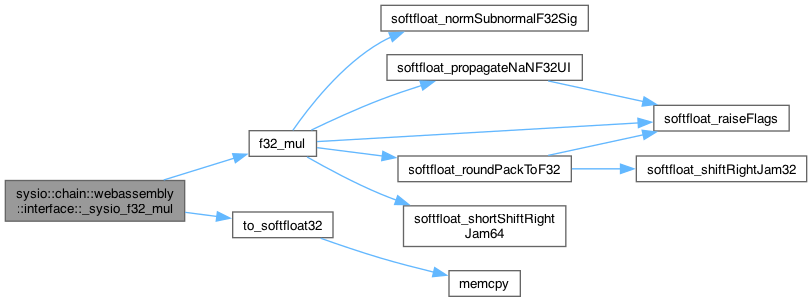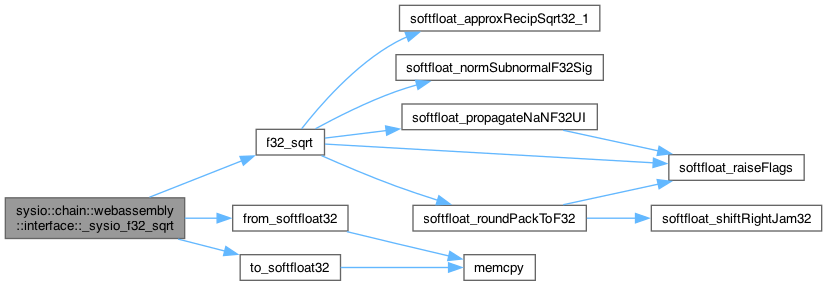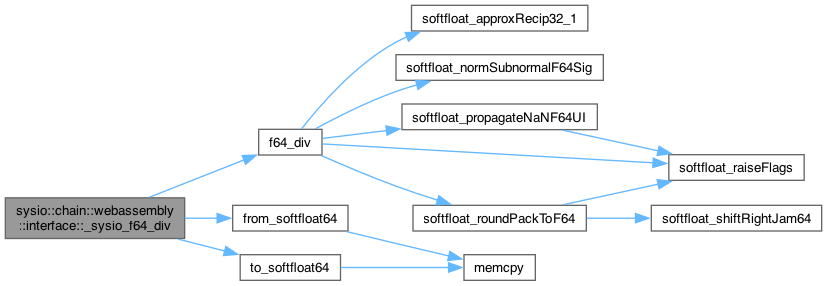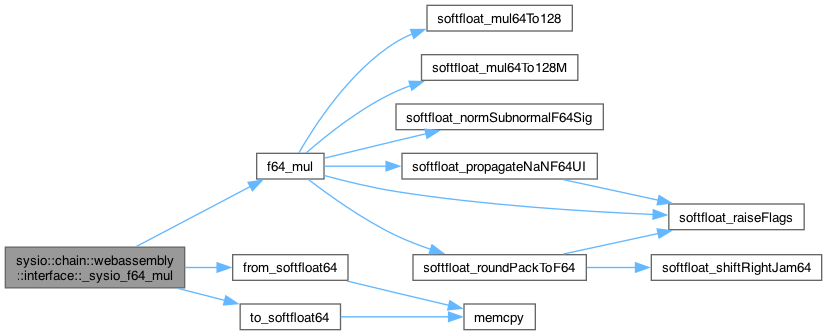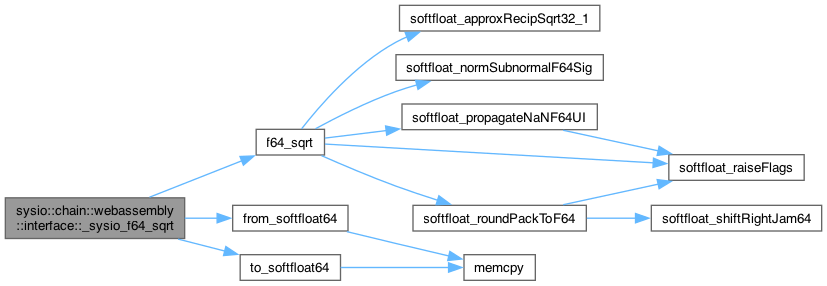#include <interface.hpp>
Detailed Description
Definition at line 13 of file interface.hpp.
Constructor & Destructor Documentation
◆ interface()
|
inline |
Definition at line 15 of file interface.hpp.
Member Function Documentation
◆ __addtf3()
| void sysio::chain::webassembly::interface::__addtf3 | ( | legacy_ptr< float128_t > | ret, |
| uint64_t | la, | ||
| uint64_t | ha, | ||
| uint64_t | lb, | ||
| uint64_t | hb ) const |
Definition at line 116 of file compiler_builtins.cpp.

◆ __ashlti3()
| void sysio::chain::webassembly::interface::__ashlti3 | ( | legacy_ptr< int128_t > | ret, |
| uint64_t | low, | ||
| uint64_t | high, | ||
| uint32_t | shift ) const |
Definition at line 10 of file compiler_builtins.cpp.
◆ __ashrti3()
| void sysio::chain::webassembly::interface::__ashrti3 | ( | legacy_ptr< int128_t > | ret, |
| uint64_t | low, | ||
| uint64_t | high, | ||
| uint32_t | shift ) const |
◆ __cmptf2()
| int sysio::chain::webassembly::interface::__cmptf2 | ( | uint64_t | la, |
| uint64_t | ha, | ||
| uint64_t | lb, | ||
| uint64_t | hb ) const |
Definition at line 245 of file compiler_builtins.cpp.
◆ __divtf3()
| void sysio::chain::webassembly::interface::__divtf3 | ( | legacy_ptr< float128_t > | ret, |
| uint64_t | la, | ||
| uint64_t | ha, | ||
| uint64_t | lb, | ||
| uint64_t | hb ) const |
Definition at line 131 of file compiler_builtins.cpp.
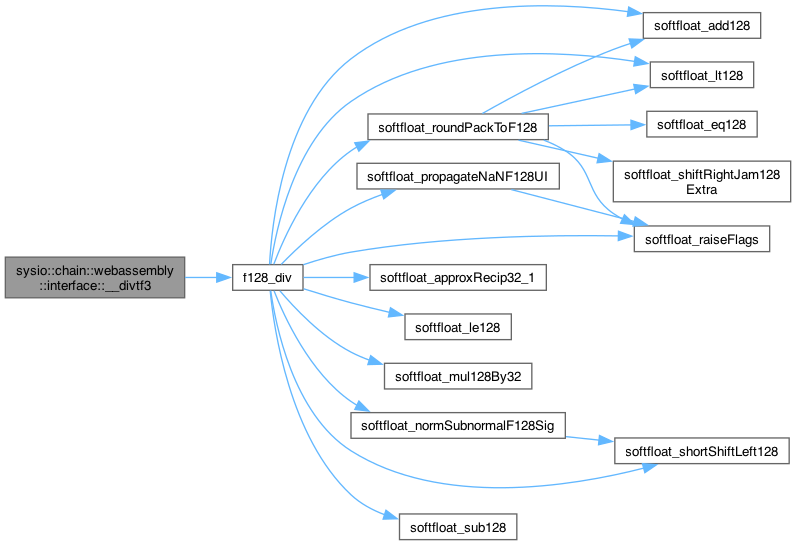
◆ __divti3()
| void sysio::chain::webassembly::interface::__divti3 | ( | legacy_ptr< int128_t > | ret, |
| uint64_t | la, | ||
| uint64_t | ha, | ||
| uint64_t | lb, | ||
| uint64_t | hb ) const |
Definition at line 36 of file compiler_builtins.cpp.
◆ __eqtf2()
| int sysio::chain::webassembly::interface::__eqtf2 | ( | uint64_t | la, |
| uint64_t | ha, | ||
| uint64_t | lb, | ||
| uint64_t | hb ) const |
Definition at line 227 of file compiler_builtins.cpp.
◆ __extenddftf2()
| void sysio::chain::webassembly::interface::__extenddftf2 | ( | legacy_ptr< float128_t > | ret, |
| double | d ) const |
Definition at line 144 of file compiler_builtins.cpp.

◆ __extendsftf2()
| void sysio::chain::webassembly::interface::__extendsftf2 | ( | legacy_ptr< float128_t > | ret, |
| float | f ) const |
Definition at line 141 of file compiler_builtins.cpp.

◆ __fixdfti()
| void sysio::chain::webassembly::interface::__fixdfti | ( | legacy_ptr< int128_t > | ret, |
| double | a ) const |
Definition at line 182 of file compiler_builtins.cpp.

◆ __fixsfti()
| void sysio::chain::webassembly::interface::__fixsfti | ( | legacy_ptr< int128_t > | ret, |
| float | a ) const |
Definition at line 179 of file compiler_builtins.cpp.

◆ __fixtfdi()
Definition at line 159 of file compiler_builtins.cpp.

◆ __fixtfsi()
Definition at line 155 of file compiler_builtins.cpp.

◆ __fixtfti()
| void sysio::chain::webassembly::interface::__fixtfti | ( | legacy_ptr< int128_t > | ret, |
| uint64_t | l, | ||
| uint64_t | h ) const |
Definition at line 163 of file compiler_builtins.cpp.

◆ __fixunsdfti()
| void sysio::chain::webassembly::interface::__fixunsdfti | ( | legacy_ptr< uint128_t > | ret, |
| double | a ) const |
Definition at line 188 of file compiler_builtins.cpp.

◆ __fixunssfti()
| void sysio::chain::webassembly::interface::__fixunssfti | ( | legacy_ptr< uint128_t > | ret, |
| float | a ) const |
Definition at line 185 of file compiler_builtins.cpp.

◆ __fixunstfdi()
Definition at line 171 of file compiler_builtins.cpp.

◆ __fixunstfsi()
Definition at line 167 of file compiler_builtins.cpp.

◆ __fixunstfti()
| void sysio::chain::webassembly::interface::__fixunstfti | ( | legacy_ptr< uint128_t > | ret, |
| uint64_t | l, | ||
| uint64_t | h ) const |
Definition at line 175 of file compiler_builtins.cpp.

◆ __floatditf()
| void sysio::chain::webassembly::interface::__floatditf | ( | legacy_ptr< float128_t > | ret, |
| uint64_t | a ) const |
Definition at line 197 of file compiler_builtins.cpp.

◆ __floatsidf()
| double sysio::chain::webassembly::interface::__floatsidf | ( | int32_t | i | ) | const |
Definition at line 191 of file compiler_builtins.cpp.

◆ __floatsitf()
| void sysio::chain::webassembly::interface::__floatsitf | ( | legacy_ptr< float128_t > | ret, |
| int32_t | i ) const |
Definition at line 194 of file compiler_builtins.cpp.

◆ __floattidf()
Definition at line 206 of file compiler_builtins.cpp.

◆ __floatunditf()
| void sysio::chain::webassembly::interface::__floatunditf | ( | legacy_ptr< float128_t > | ret, |
| uint64_t | a ) const |
Definition at line 203 of file compiler_builtins.cpp.

◆ __floatunsitf()
| void sysio::chain::webassembly::interface::__floatunsitf | ( | legacy_ptr< float128_t > | ret, |
| uint32_t | i ) const |
Definition at line 200 of file compiler_builtins.cpp.

◆ __floatuntidf()
Definition at line 211 of file compiler_builtins.cpp.

◆ __getf2()
| int sysio::chain::webassembly::interface::__getf2 | ( | uint64_t | la, |
| uint64_t | ha, | ||
| uint64_t | lb, | ||
| uint64_t | hb ) const |
Definition at line 233 of file compiler_builtins.cpp.
◆ __gttf2()
| int sysio::chain::webassembly::interface::__gttf2 | ( | uint64_t | la, |
| uint64_t | ha, | ||
| uint64_t | lb, | ||
| uint64_t | hb ) const |
Definition at line 236 of file compiler_builtins.cpp.
◆ __letf2()
| int sysio::chain::webassembly::interface::__letf2 | ( | uint64_t | la, |
| uint64_t | ha, | ||
| uint64_t | lb, | ||
| uint64_t | hb ) const |
Definition at line 239 of file compiler_builtins.cpp.
◆ __lshlti3()
| void sysio::chain::webassembly::interface::__lshlti3 | ( | legacy_ptr< int128_t > | ret, |
| uint64_t | low, | ||
| uint64_t | high, | ||
| uint32_t | shift ) const |
Definition at line 24 of file compiler_builtins.cpp.
◆ __lshrti3()
| void sysio::chain::webassembly::interface::__lshrti3 | ( | legacy_ptr< int128_t > | ret, |
| uint64_t | low, | ||
| uint64_t | high, | ||
| uint32_t | shift ) const |
Definition at line 30 of file compiler_builtins.cpp.
◆ __lttf2()
| int sysio::chain::webassembly::interface::__lttf2 | ( | uint64_t | la, |
| uint64_t | ha, | ||
| uint64_t | lb, | ||
| uint64_t | hb ) const |
Definition at line 242 of file compiler_builtins.cpp.
◆ __modti3()
| void sysio::chain::webassembly::interface::__modti3 | ( | legacy_ptr< int128_t > | ret, |
| uint64_t | la, | ||
| uint64_t | ha, | ||
| uint64_t | lb, | ||
| uint64_t | hb ) const |
Definition at line 83 of file compiler_builtins.cpp.
◆ __multf3()
| void sysio::chain::webassembly::interface::__multf3 | ( | legacy_ptr< float128_t > | ret, |
| uint64_t | la, | ||
| uint64_t | ha, | ||
| uint64_t | lb, | ||
| uint64_t | hb ) const |
Definition at line 126 of file compiler_builtins.cpp.
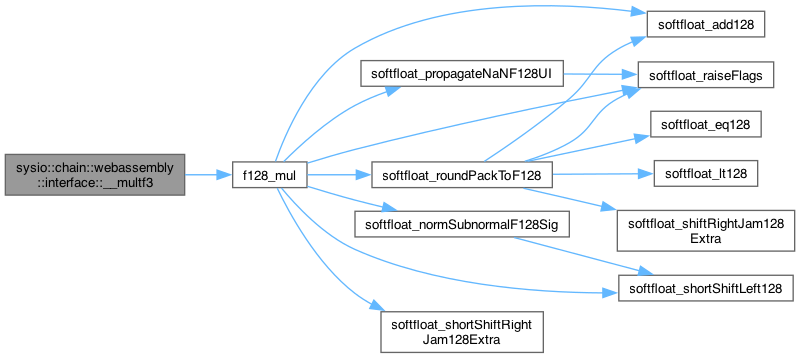
◆ __multi3()
| void sysio::chain::webassembly::interface::__multi3 | ( | legacy_ptr< int128_t > | ret, |
| uint64_t | la, | ||
| uint64_t | ha, | ||
| uint64_t | lb, | ||
| uint64_t | hb ) const |
Definition at line 69 of file compiler_builtins.cpp.
◆ __negtf2()
| void sysio::chain::webassembly::interface::__negtf2 | ( | legacy_ptr< float128_t > | ret, |
| uint64_t | la, | ||
| uint64_t | ha ) const |
Definition at line 136 of file compiler_builtins.cpp.
◆ __netf2()
| int sysio::chain::webassembly::interface::__netf2 | ( | uint64_t | la, |
| uint64_t | ha, | ||
| uint64_t | lb, | ||
| uint64_t | hb ) const |
Definition at line 230 of file compiler_builtins.cpp.
◆ __subtf3()
| void sysio::chain::webassembly::interface::__subtf3 | ( | legacy_ptr< float128_t > | ret, |
| uint64_t | la, | ||
| uint64_t | ha, | ||
| uint64_t | lb, | ||
| uint64_t | hb ) const |
Definition at line 121 of file compiler_builtins.cpp.

◆ __trunctfdf2()
Definition at line 147 of file compiler_builtins.cpp.

◆ __trunctfsf2()
Definition at line 151 of file compiler_builtins.cpp.

◆ __udivti3()
| void sysio::chain::webassembly::interface::__udivti3 | ( | legacy_ptr< uint128_t > | ret, |
| uint64_t | la, | ||
| uint64_t | ha, | ||
| uint64_t | lb, | ||
| uint64_t | hb ) const |
Definition at line 53 of file compiler_builtins.cpp.
◆ __umodti3()
| void sysio::chain::webassembly::interface::__umodti3 | ( | legacy_ptr< uint128_t > | ret, |
| uint64_t | la, | ||
| uint64_t | ha, | ||
| uint64_t | lb, | ||
| uint64_t | hb ) const |
Definition at line 99 of file compiler_builtins.cpp.
◆ __unordtf2()
| int sysio::chain::webassembly::interface::__unordtf2 | ( | uint64_t | la, |
| uint64_t | ha, | ||
| uint64_t | lb, | ||
| uint64_t | hb ) const |
Definition at line 248 of file compiler_builtins.cpp.

◆ _sysio_f32_abs()
| float sysio::chain::webassembly::interface::_sysio_f32_abs | ( | float | af | ) | const |
Definition at line 71 of file softfloat.cpp.

◆ _sysio_f32_add()
| float sysio::chain::webassembly::interface::_sysio_f32_add | ( | float | a, |
| float | b ) const |
◆ _sysio_f32_ceil()
| float sysio::chain::webassembly::interface::_sysio_f32_ceil | ( | float | af | ) | const |
Definition at line 88 of file softfloat.cpp.

◆ _sysio_f32_copysign()
| float sysio::chain::webassembly::interface::_sysio_f32_copysign | ( | float | af, |
| float | bf ) const |
◆ _sysio_f32_div()
| float sysio::chain::webassembly::interface::_sysio_f32_div | ( | float | a, |
| float | b ) const |
◆ _sysio_f32_eq()
| bool sysio::chain::webassembly::interface::_sysio_f32_eq | ( | float | a, |
| float | b ) const |
◆ _sysio_f32_floor()
| float sysio::chain::webassembly::interface::_sysio_f32_floor | ( | float | af | ) | const |
◆ _sysio_f32_ge()
| bool sysio::chain::webassembly::interface::_sysio_f32_ge | ( | float | af, |
| float | bf ) const |
Definition at line 175 of file softfloat.cpp.

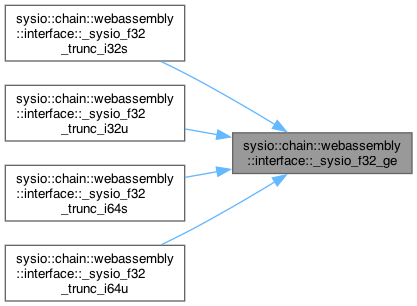
◆ _sysio_f32_gt()
| bool sysio::chain::webassembly::interface::_sysio_f32_gt | ( | float | af, |
| float | bf ) const |
Definition at line 166 of file softfloat.cpp.

◆ _sysio_f32_le()
| bool sysio::chain::webassembly::interface::_sysio_f32_le | ( | float | a, |
| float | b ) const |
Definition at line 165 of file softfloat.cpp.

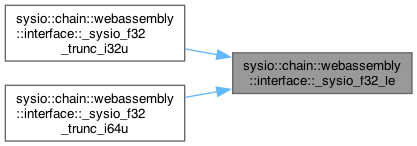
◆ _sysio_f32_lt()
| bool sysio::chain::webassembly::interface::_sysio_f32_lt | ( | float | a, |
| float | b ) const |
Definition at line 164 of file softfloat.cpp.

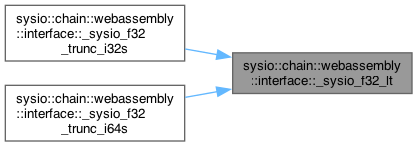
◆ _sysio_f32_max()
| float sysio::chain::webassembly::interface::_sysio_f32_max | ( | float | af, |
| float | bf ) const |
Definition at line 48 of file softfloat.cpp.

◆ _sysio_f32_min()
| float sysio::chain::webassembly::interface::_sysio_f32_min | ( | float | af, |
| float | bf ) const |
Definition at line 34 of file softfloat.cpp.

◆ _sysio_f32_mul()
| float sysio::chain::webassembly::interface::_sysio_f32_mul | ( | float | a, |
| float | b ) const |
◆ _sysio_f32_ne()
| bool sysio::chain::webassembly::interface::_sysio_f32_ne | ( | float | a, |
| float | b ) const |
◆ _sysio_f32_nearest()
| float sysio::chain::webassembly::interface::_sysio_f32_nearest | ( | float | af | ) | const |
Definition at line 145 of file softfloat.cpp.

◆ _sysio_f32_neg()
| float sysio::chain::webassembly::interface::_sysio_f32_neg | ( | float | af | ) | const |
Definition at line 76 of file softfloat.cpp.

◆ _sysio_f32_promote()
| double sysio::chain::webassembly::interface::_sysio_f32_promote | ( | float | a | ) | const |
◆ _sysio_f32_sqrt()
| float sysio::chain::webassembly::interface::_sysio_f32_sqrt | ( | float | a | ) | const |
◆ _sysio_f32_sub()
| float sysio::chain::webassembly::interface::_sysio_f32_sub | ( | float | a, |
| float | b ) const |
◆ _sysio_f32_trunc()
| float sysio::chain::webassembly::interface::_sysio_f32_trunc | ( | float | af | ) | const |
Definition at line 131 of file softfloat.cpp.

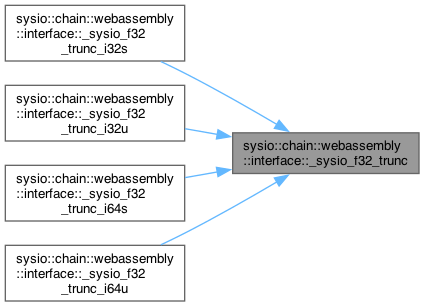
◆ _sysio_f32_trunc_i32s()
| int32_t sysio::chain::webassembly::interface::_sysio_f32_trunc_i32s | ( | float | af | ) | const |
Definition at line 361 of file softfloat.cpp.
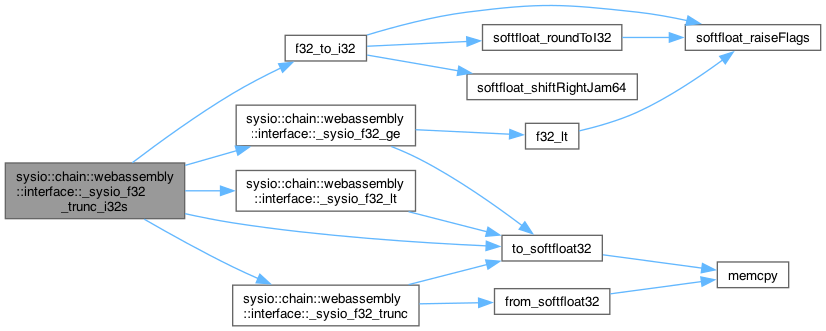
◆ _sysio_f32_trunc_i32u()
| uint32_t sysio::chain::webassembly::interface::_sysio_f32_trunc_i32u | ( | float | af | ) | const |
Definition at line 378 of file softfloat.cpp.
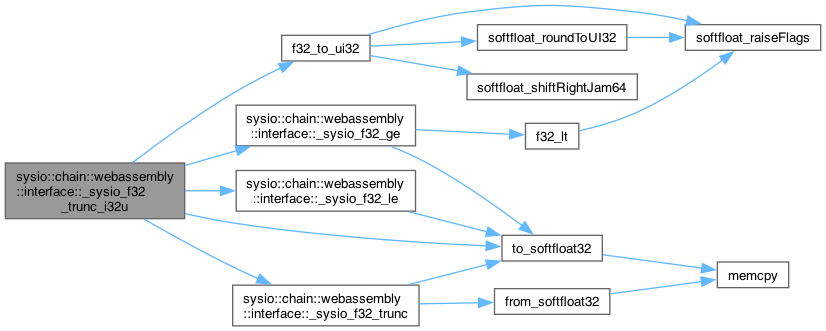
◆ _sysio_f32_trunc_i64s()
| int64_t sysio::chain::webassembly::interface::_sysio_f32_trunc_i64s | ( | float | af | ) | const |
Definition at line 394 of file softfloat.cpp.

◆ _sysio_f32_trunc_i64u()
| uint64_t sysio::chain::webassembly::interface::_sysio_f32_trunc_i64u | ( | float | af | ) | const |
Definition at line 411 of file softfloat.cpp.
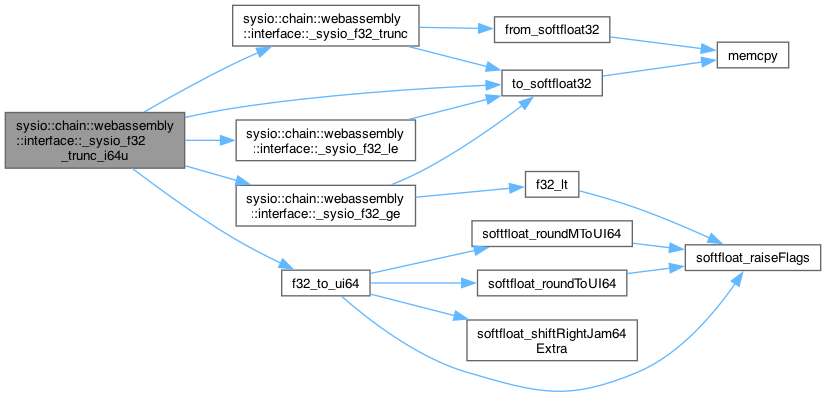
◆ _sysio_f64_abs()
| double sysio::chain::webassembly::interface::_sysio_f64_abs | ( | double | af | ) | const |
Definition at line 234 of file softfloat.cpp.

◆ _sysio_f64_add()
| double sysio::chain::webassembly::interface::_sysio_f64_add | ( | double | a, |
| double | b ) const |
◆ _sysio_f64_ceil()
| double sysio::chain::webassembly::interface::_sysio_f64_ceil | ( | double | af | ) | const |
Definition at line 251 of file softfloat.cpp.

◆ _sysio_f64_copysign()
| double sysio::chain::webassembly::interface::_sysio_f64_copysign | ( | double | af, |
| double | bf ) const |
◆ _sysio_f64_demote()
| float sysio::chain::webassembly::interface::_sysio_f64_demote | ( | double | a | ) | const |
◆ _sysio_f64_div()
| double sysio::chain::webassembly::interface::_sysio_f64_div | ( | double | a, |
| double | b ) const |
◆ _sysio_f64_eq()
| bool sysio::chain::webassembly::interface::_sysio_f64_eq | ( | double | a, |
| double | b ) const |
◆ _sysio_f64_floor()
| double sysio::chain::webassembly::interface::_sysio_f64_floor | ( | double | af | ) | const |
Definition at line 274 of file softfloat.cpp.

◆ _sysio_f64_ge()
| bool sysio::chain::webassembly::interface::_sysio_f64_ge | ( | double | af, |
| double | bf ) const |
Definition at line 344 of file softfloat.cpp.

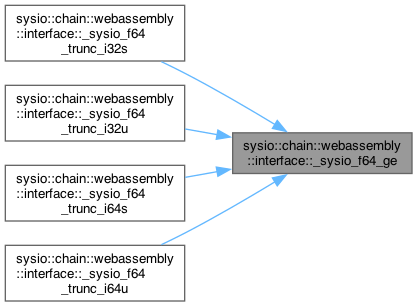
◆ _sysio_f64_gt()
| bool sysio::chain::webassembly::interface::_sysio_f64_gt | ( | double | af, |
| double | bf ) const |
Definition at line 335 of file softfloat.cpp.

◆ _sysio_f64_le()
| bool sysio::chain::webassembly::interface::_sysio_f64_le | ( | double | a, |
| double | b ) const |
Definition at line 334 of file softfloat.cpp.

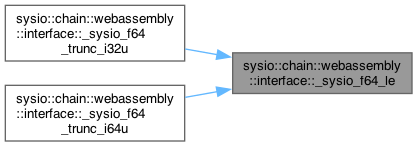
◆ _sysio_f64_lt()
| bool sysio::chain::webassembly::interface::_sysio_f64_lt | ( | double | a, |
| double | b ) const |
Definition at line 333 of file softfloat.cpp.

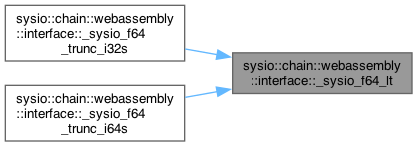
◆ _sysio_f64_max()
| double sysio::chain::webassembly::interface::_sysio_f64_max | ( | double | af, |
| double | bf ) const |
Definition at line 213 of file softfloat.cpp.

◆ _sysio_f64_min()
| double sysio::chain::webassembly::interface::_sysio_f64_min | ( | double | af, |
| double | bf ) const |
Definition at line 202 of file softfloat.cpp.

◆ _sysio_f64_mul()
| double sysio::chain::webassembly::interface::_sysio_f64_mul | ( | double | a, |
| double | b ) const |
◆ _sysio_f64_ne()
| bool sysio::chain::webassembly::interface::_sysio_f64_ne | ( | double | a, |
| double | b ) const |
◆ _sysio_f64_nearest()
| double sysio::chain::webassembly::interface::_sysio_f64_nearest | ( | double | af | ) | const |
Definition at line 314 of file softfloat.cpp.

◆ _sysio_f64_neg()
| double sysio::chain::webassembly::interface::_sysio_f64_neg | ( | double | af | ) | const |
◆ _sysio_f64_sqrt()
| double sysio::chain::webassembly::interface::_sysio_f64_sqrt | ( | double | a | ) | const |
◆ _sysio_f64_sub()
| double sysio::chain::webassembly::interface::_sysio_f64_sub | ( | double | a, |
| double | b ) const |
◆ _sysio_f64_trunc()
| double sysio::chain::webassembly::interface::_sysio_f64_trunc | ( | double | af | ) | const |
Definition at line 299 of file softfloat.cpp.

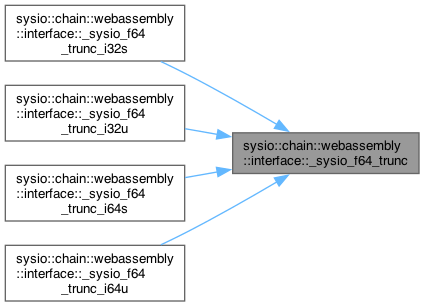
◆ _sysio_f64_trunc_i32s()
| int32_t sysio::chain::webassembly::interface::_sysio_f64_trunc_i32s | ( | double | af | ) | const |
Definition at line 370 of file softfloat.cpp.
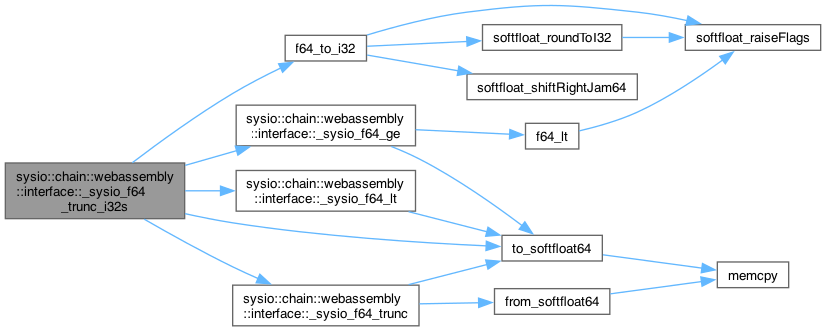
◆ _sysio_f64_trunc_i32u()
| uint32_t sysio::chain::webassembly::interface::_sysio_f64_trunc_i32u | ( | double | af | ) | const |
Definition at line 386 of file softfloat.cpp.
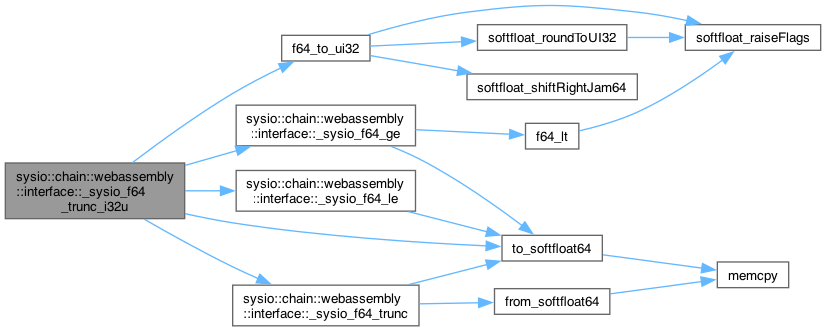
◆ _sysio_f64_trunc_i64s()
| int64_t sysio::chain::webassembly::interface::_sysio_f64_trunc_i64s | ( | double | af | ) | const |
Definition at line 402 of file softfloat.cpp.
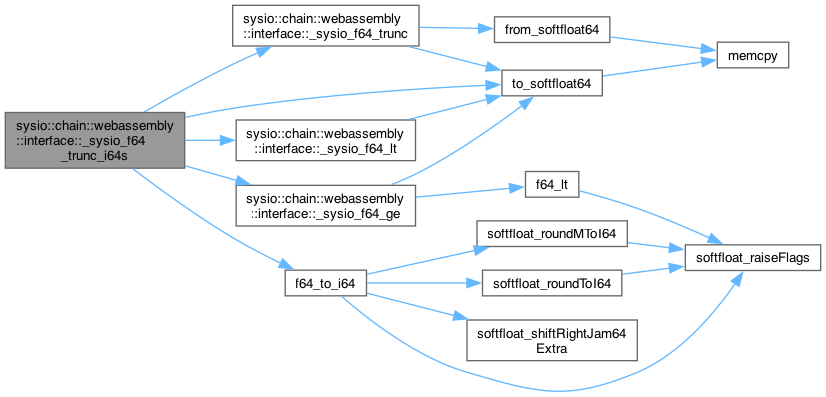
◆ _sysio_f64_trunc_i64u()
| uint64_t sysio::chain::webassembly::interface::_sysio_f64_trunc_i64u | ( | double | af | ) | const |
Definition at line 419 of file softfloat.cpp.
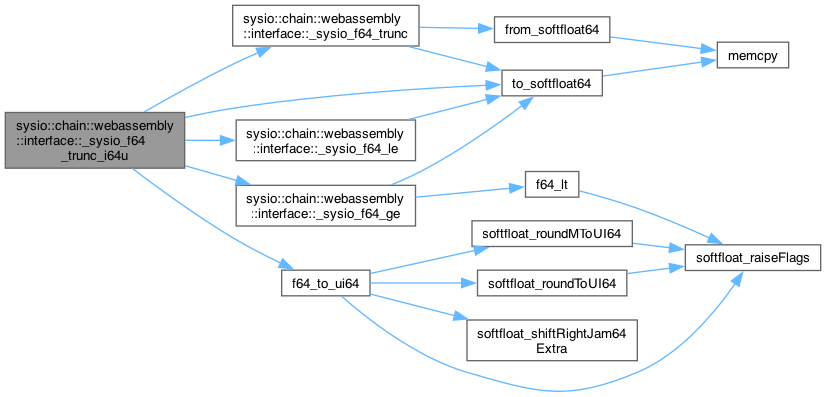
◆ _sysio_i32_to_f32()
| float sysio::chain::webassembly::interface::_sysio_i32_to_f32 | ( | int32_t | a | ) | const |
◆ _sysio_i32_to_f64()
| double sysio::chain::webassembly::interface::_sysio_i32_to_f64 | ( | int32_t | a | ) | const |
◆ _sysio_i64_to_f32()
| float sysio::chain::webassembly::interface::_sysio_i64_to_f32 | ( | int64_t | a | ) | const |
◆ _sysio_i64_to_f64()
| double sysio::chain::webassembly::interface::_sysio_i64_to_f64 | ( | int64_t | a | ) | const |
◆ _sysio_ui32_to_f32()
| float sysio::chain::webassembly::interface::_sysio_ui32_to_f32 | ( | uint32_t | a | ) | const |
◆ _sysio_ui32_to_f64()
| double sysio::chain::webassembly::interface::_sysio_ui32_to_f64 | ( | uint32_t | a | ) | const |
◆ _sysio_ui64_to_f32()
| float sysio::chain::webassembly::interface::_sysio_ui64_to_f32 | ( | uint64_t | a | ) | const |
◆ _sysio_ui64_to_f64()
| double sysio::chain::webassembly::interface::_sysio_ui64_to_f64 | ( | uint64_t | a | ) | const |
◆ abort()
| void sysio::chain::webassembly::interface::abort | ( | ) | const |
Aborts processing of this action and unwinds all pending changes.
Definition at line 6 of file cf_system.cpp.
◆ action_data_size()
| int32_t sysio::chain::webassembly::interface::action_data_size | ( | ) | const |
Get the length of the current action's data field. This method is useful for dynamically sized actions.
- Returns
- the length of the current action's data field
Definition at line 16 of file action.cpp.
◆ activate_feature()
| void sysio::chain::webassembly::interface::activate_feature | ( | int64_t | feature_name | ) | const |
Activate a a consensus protocol upgrade.
- Parameters
-
feature_name - 256-bit digest representing the feature to activate.
Definition at line 15 of file privileged.cpp.
◆ alt_bn128_add()
| int32_t sysio::chain::webassembly::interface::alt_bn128_add | ( | span< const char > | op1, |
| span< const char > | op2, | ||
| span< char > | result ) const |
Host function for addition on the elliptic curve alt_bn128
- Parameters
-
op1 - a span containing the first operand G1 point. op2 - a span containing the second operand G1 point. [out] result - the result op1 + op2.
- Returns
- -1 if there was an error 0 otherwise
Definition at line 119 of file crypto.cpp.
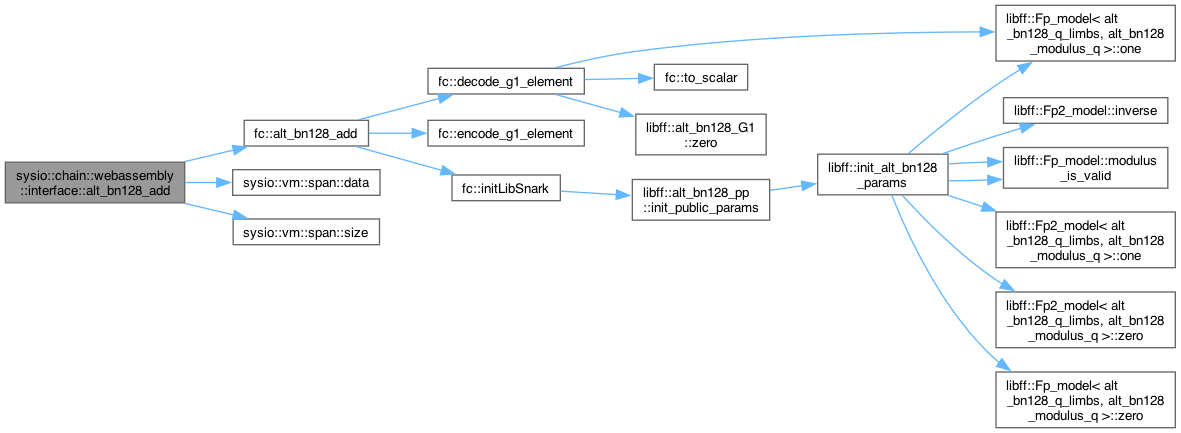
◆ alt_bn128_mul()
| int32_t sysio::chain::webassembly::interface::alt_bn128_mul | ( | span< const char > | g1_point, |
| span< const char > | scalar, | ||
| span< char > | result ) const |
Host function for scalar multiplication on the elliptic curve alt_bn128
- Parameters
-
g1_point - a span containing G1 point. scalar - a span containing the scalar. [out] result - g1 * scalar.
- Returns
- -1 if there was an error 0 otherwise
Definition at line 137 of file crypto.cpp.
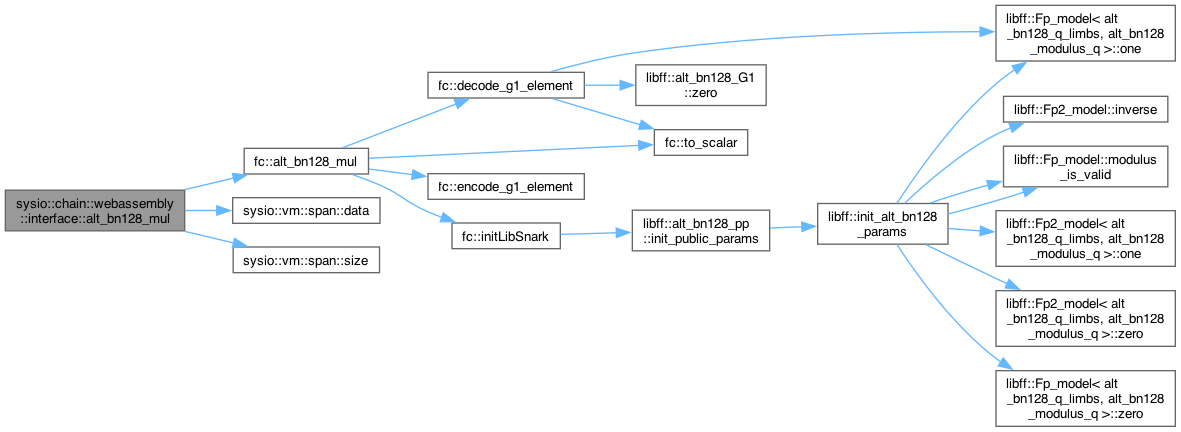
◆ alt_bn128_pair()
| int32_t sysio::chain::webassembly::interface::alt_bn128_pair | ( | span< const char > | g1_g2_pairs | ) | const |
Host function for optimal ate pairing check on the elliptic curve alt_bn128
- Parameters
-
g1_g2_pairs - a span containing pairs of G1,G2 points. (2 * 32 bytes) + (2 * 64 bytes)
- Returns
- -1 if there was an error, 1 if false and 0 if true
Definition at line 155 of file crypto.cpp.
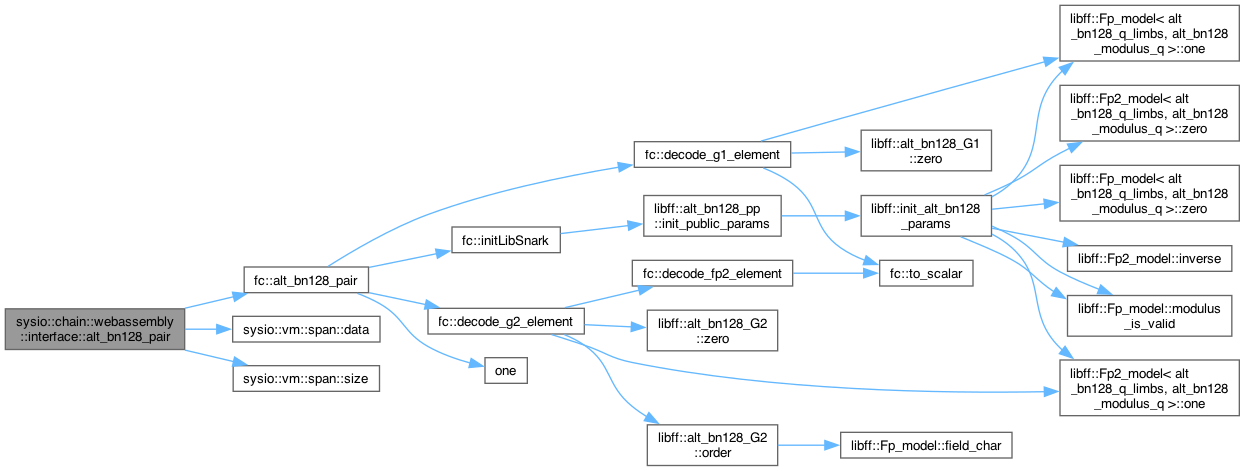
◆ assert_recover_key()
| void sysio::chain::webassembly::interface::assert_recover_key | ( | legacy_ptr< const fc::sha256 > | digest, |
| legacy_span< const char > | sig, | ||
| legacy_span< const char > | pub ) const |
Tests a given public key with the recovered public key from digest and signature.
- Parameters
-
digest - digest of the message that was signed. sig - signature. pub - public key.
Definition at line 23 of file crypto.cpp.

◆ assert_ripemd160()
| void sysio::chain::webassembly::interface::assert_ripemd160 | ( | legacy_span< const char > | data, |
| legacy_ptr< const fc::ripemd160 > | hash_val ) const |
Tests if the ripemd160 hash generated from data matches the provided digest.
- Parameters
-
data - a span containing the data you want to hash. hash_val - digest to compare to.
Definition at line 98 of file crypto.cpp.
◆ assert_sha1()
| void sysio::chain::webassembly::interface::assert_sha1 | ( | legacy_span< const char > | data, |
| legacy_ptr< const fc::sha1 > | hash_val ) const |
Tests if the sha1 hash generated from data matches the provided digest.
- Parameters
-
data - a span containing the data you want to hash. hash_val - digest to compare to.
Definition at line 88 of file crypto.cpp.
◆ assert_sha256()
| void sysio::chain::webassembly::interface::assert_sha256 | ( | legacy_span< const char > | data, |
| legacy_ptr< const fc::sha256 > | hash_val ) const |
Tests if the sha256 hash generated from data matches the provided digest.
- Parameters
-
data - a span containing the data you want to hash. hash_val - digest to compare to.
Definition at line 83 of file crypto.cpp.
◆ assert_sha512()
| void sysio::chain::webassembly::interface::assert_sha512 | ( | legacy_span< const char > | data, |
| legacy_ptr< const fc::sha512 > | hash_val ) const |
Tests if the sha512 hash generated from data matches the provided digest.
- Parameters
-
data - a span containing the data you want to hash. hash_val - digest to compare to.
Definition at line 93 of file crypto.cpp.
◆ blake2_f()
| int32_t sysio::chain::webassembly::interface::blake2_f | ( | uint32_t | rounds, |
| span< const char > | state, | ||
| span< const char > | message, | ||
| span< const char > | t0_offset, | ||
| span< const char > | t1_offset, | ||
| int32_t | final, | ||
| span< char > | result ) const |
BLAKE2 compression function F https://eips.ethereum.org/EIPS/eip-152 Precompiled contract which implements the compression function F used in the BLAKE2 cryptographic hashing algorithm.
- Parameters
-
rounds - the number of rounds - 32-bit unsigned big-endian word state - a span containing the state vector - 8 unsigned 64-bit little-endian words message - a span containing the message block vector - 16 unsigned 64-bit little-endian words t0_offset - offset counters - unsigned 64-bit little-endian word t1_offset - offset counters - unsigned 64-bit little-endian word final - the final block indicator flag - (1-true, all other values == false) [out] result - the result
- Returns
- -1 if there was an error 0 otherwise
Definition at line 207 of file crypto.cpp.

◆ cancel_deferred()
| bool sysio::chain::webassembly::interface::cancel_deferred | ( | legacy_ptr< const uint128_t > | val | ) |
Cancels a deferred transaction.
- Parameters
-
val - The id of the sender.
- Return values
-
false if transaction was not found. true if transaction was canceled.
Definition at line 32 of file transaction.cpp.
◆ check_permission_authorization()
| bool sysio::chain::webassembly::interface::check_permission_authorization | ( | account_name | account, |
| permission_name | permission, | ||
| legacy_span< const char > | pubkeys_data, | ||
| legacy_span< const char > | perms_data, | ||
| uint64_t | delay_us ) const |
Checks if a permission is authorized by a provided delay and a provided set of keys and permissions.
- Parameters
-
account - the account owner of the permission. permission - the name of the permission to check for authorization. pubkeys_data - serialized vector of provided public keys. perms_data - serialized vector of provided permissions (empty permission name acts as wildcard). delay_us - the provided delay in microseconds (cannot exceed INT64_MAX)
- Return values
-
true if permission is authorized. false otherwise.
Definition at line 48 of file permission.cpp.

◆ check_transaction_authorization()
| bool sysio::chain::webassembly::interface::check_transaction_authorization | ( | legacy_span< const char > | trx_data, |
| legacy_span< const char > | pubkeys_data, | ||
| legacy_span< const char > | perms_data ) const |
Checks if a transaction is authorized by a provided set of keys and permissions.
- Parameters
-
trx_data - serialized transaction. pubkeys_data - serialized vector of provided public keys. perms_data - serialized vector of provided permissions (empty permission name acts as wildcard).
- Return values
-
true if transaction is authorized. false otherwise.
Definition at line 21 of file permission.cpp.
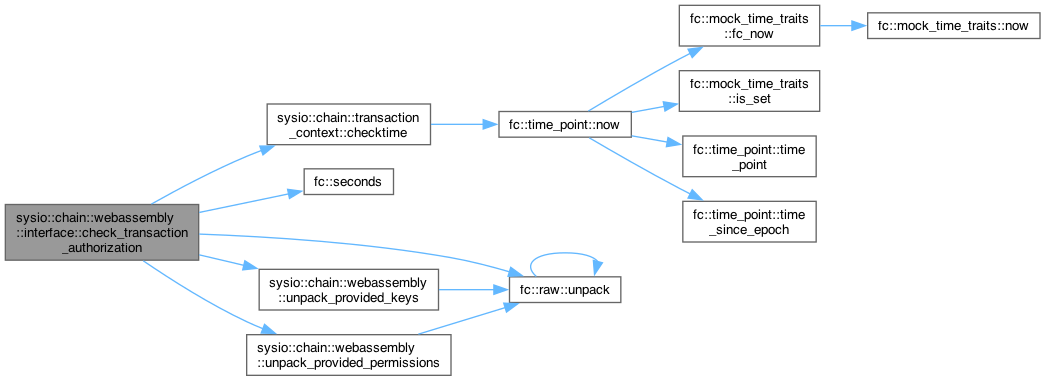
◆ current_receiver()
| name sysio::chain::webassembly::interface::current_receiver | ( | ) | const |
Get the current receiver of the action.
- Returns
- the name of the receiver
Definition at line 20 of file action.cpp.
◆ current_time()
| uint64_t sysio::chain::webassembly::interface::current_time | ( | ) | const |
Returns the time in microseconds from 1970 of the current block.
- Returns
- time in microseconds from 1970 of the current block.
Definition at line 7 of file system.cpp.
◆ db_end_i64()
| int32_t sysio::chain::webassembly::interface::db_end_i64 | ( | uint64_t | code, |
| uint64_t | scope, | ||
| uint64_t | table ) |
Get an iterator representing just-past-the-end of the last table row of a primary 64-bit integer index table.
- Parameters
-
code - the name of the owner of the table. scope - the scope where the table resides. table - the table name.
- Returns
- end iterator of the table.
Definition at line 35 of file database.cpp.
◆ db_find_i64()
| int32_t sysio::chain::webassembly::interface::db_find_i64 | ( | uint64_t | code, |
| uint64_t | scope, | ||
| uint64_t | table, | ||
| uint64_t | id ) |
Find a table row in a primary 64-bit integer index table by primary key.
- Parameters
-
code - the name of the owner of the table. scope - the scope where the table resides. table - the table name. id - the primary key of the record to look up.
- Returns
- iterator to the table row with a primary key equal to id or the end iterator of the table if the table row could not be found.
Definition at line 26 of file database.cpp.
◆ db_get_i64()
| int32_t sysio::chain::webassembly::interface::db_get_i64 | ( | int32_t | itr, |
| legacy_span< char > | buffer ) |
Get a record in a primary 64-bit integer index table.
- Parameters
-
itr - the iterator to the table row containing the record to retrieve. [out] buffer - the buffer which will be filled with the retrieved record.
- Returns
- size of the data copied into the buffer if buffer is not empty, or size of the retrieved record if the buffer is empty.
- Precondition
itrpoints to an existing table row in the table.
- Postcondition
bufferwill be filled with the retrieved record (truncated to the firstlenbytes if necessary).
Definition at line 17 of file database.cpp.
◆ db_idx128_end()
| int32_t sysio::chain::webassembly::interface::db_idx128_end | ( | uint64_t | code, |
| uint64_t | scope, | ||
| uint64_t | table ) |
Get an end iterator representing just-past-the-end of the last table row of a secondary 128-bit integer index table.
- Parameters
-
code - the name of the owner of the table. scope - the scope where the table resides. table - the table name.
- Returns
- end iterator of the table.
Definition at line 110 of file database.cpp.
◆ db_idx128_find_primary()
| int32_t sysio::chain::webassembly::interface::db_idx128_find_primary | ( | uint64_t | code, |
| uint64_t | scope, | ||
| uint64_t | table, | ||
| legacy_ptr< uint128_t > | secondary, | ||
| uint64_t | primary ) |
Find a table row in a secondary 128-bit integer index table by primary key.
- Parameters
-
code - the name of the owner of the table. scope - the scope where the table resides. table - the table name. [out] secondary - pointer to a 'uint128_t' variable which will have its value set to the secondary key of the found table row. primary - the primary key of the table row to look up.
- Returns
- iterator to the table row with a primary key equal to
primaryor the end iterator of the table if the table row could not be found.
- Postcondition
- If and only if the table row is found,
*secondarywill be replaced with the secondary key of the found table row.
Definition at line 95 of file database.cpp.
◆ db_idx128_find_secondary()
| int32_t sysio::chain::webassembly::interface::db_idx128_find_secondary | ( | uint64_t | code, |
| uint64_t | scope, | ||
| uint64_t | table, | ||
| legacy_ptr< const uint128_t > | secondary, | ||
| legacy_ptr< uint64_t > | primary ) |
Find a table row in a secondary 128-bit integer index table by secondary key.
- Parameters
-
code - the name of the owner of the table. scope - the scope where the table resides. table - the table name. secondary - the pointer to the secondary index key. [out] primary - pointer to a 'uint64_t' variable which will have its value set to the primary key of the found table row.
- Returns
- iterator to the first table row with a secondary key equal to
*secondaryor the end iterator of the table if the table row could not be found.
- Postcondition
- If and only if the table row is found,
*primarywill be replaced with the primary key of the found table row.
Definition at line 92 of file database.cpp.
◆ db_idx128_lowerbound()
| int32_t sysio::chain::webassembly::interface::db_idx128_lowerbound | ( | uint64_t | code, |
| uint64_t | scope, | ||
| uint64_t | table, | ||
| legacy_ptr< uint128_t, 16 > | secondary, | ||
| legacy_ptr< uint64_t, 8 > | primary ) |
Find the table row in a secondary 128-bit integer index table that matches the lowerbound condition for a given secondary key. Lowerbound secondary index is the first secondary index which key is <= the given secondary index key.
- Parameters
-
code - the name of the owner of the table. scope - the scope where the table resides. table - the table name. [out] secondary - pointer to secondary key first used to determine the lowerbound and which is then replaced with the secondary key of the found table row. [out] primary - pointer to a uint64_tvariable which will have its value set to the primary key of the found table row.
- Returns
- iterator to the found table row or the end iterator of the table if the table row could not be found.
- Postcondition
- If and only if the table row is found,
*secondarywill be replaced with the secondary key of the found table row. -
If and only if the table row is found,
*primarywill be replaced with the primary key of the found table row.
Definition at line 98 of file database.cpp.
◆ db_idx128_next()
| int32_t sysio::chain::webassembly::interface::db_idx128_next | ( | int32_t | iterator, |
| legacy_ptr< uint64_t > | primary ) |
Find the table row following the referenced table row in a secondary 128-bit integer index table.
- Parameters
-
iterator - the iterator to the referenced table row. [out] primary - pointer to a uint64_tvariable which will have its value set to the primary key of the next table row.
- Returns
- iterator to the table row following the referenced table row (or the end iterator of the table if the referenced table row is the last one in the table).
- Precondition
iteratorpoints to an existing table row in the table.
- Postcondition
*primarywill be replaced with the primary key of the table row following the referenced table row if it exists, otherwise*primarywill be left untouched.
Definition at line 113 of file database.cpp.
◆ db_idx128_previous()
| int32_t sysio::chain::webassembly::interface::db_idx128_previous | ( | int32_t | iterator, |
| legacy_ptr< uint64_t > | primary ) |
Find the table row preceding the referenced table row in a secondary 128-bit integer index table.
- Parameters
-
iterator - the iterator to the referenced table row. [out] primary - pointer to a uint64_tvariable which will have its value set to the primary key of the previous table row.
- Returns
- iterator to the table row preceding the referenced table row assuming one exists (it will return -1 if the referenced table row is the first one in the table).
- Precondition
iteratorpoints to an existing table row in the table or it is the end iterator of the table.
- Postcondition
*primarywill be replaced with the primary key of the table row preceding the referenced table row if it exists, otherwise*primarywill be left untouched.
Definition at line 116 of file database.cpp.
◆ db_idx128_remove()
| void sysio::chain::webassembly::interface::db_idx128_remove | ( | int32_t | iterator | ) |
Remove a table row from a secondary 128-bit integer index table.
- Parameters
-
iterator - iterator to the table row to remove.
- Precondition
iteratorpoints to an existing table row in the table.
- Postcondition
- the table row pointed to by
iteratoris removed and the associated storage costs are refunded to the payer.
Definition at line 89 of file database.cpp.
◆ db_idx128_store()
| int32_t sysio::chain::webassembly::interface::db_idx128_store | ( | uint64_t | scope, |
| uint64_t | table, | ||
| uint64_t | payer, | ||
| uint64_t | id, | ||
| legacy_ptr< const uint128_t > | secondary ) |
Store an association of a 128-bit integer secondary key to a primary key in a secondary 128-bit integer index table.
- Parameters
-
scope - the scope where the table resides (implied to be within the code of the current receiver). table - the table name. payer - the account that is paying for this storage. id - the primary key to which to associate the secondary key. secondary - the pointer to the key of the secondary index to store.
- Returns
- iterator to the newly created secondary index.
- Postcondition
- new secondary key association between primary key
idand secondary key*secondaryis created in the secondary 128-bit integer index table.
interface for uint128_t secondary
Definition at line 83 of file database.cpp.
◆ db_idx128_update()
| void sysio::chain::webassembly::interface::db_idx128_update | ( | int32_t | iterator, |
| uint64_t | payer, | ||
| legacy_ptr< const uint128_t > | secondary ) |
Update an association for a 128-bit integer secondary key to a primary key in a secondary 128-bit integer index table.
- Parameters
-
iterator - the iterator to the table row containing the secondary key association to update. payer - the account that pays for the storage costs. secondary - pointer to the new secondary key that will replace the existing one of the association.
- Precondition
iteratorpoints to an existing table row in the table.
- Postcondition
- the secondary key of the table row pointed to by
iteratoris replaced by*secondary.
Definition at line 86 of file database.cpp.
◆ db_idx128_upperbound()
| int32_t sysio::chain::webassembly::interface::db_idx128_upperbound | ( | uint64_t | code, |
| uint64_t | scope, | ||
| uint64_t | table, | ||
| legacy_ptr< uint128_t, 16 > | secondary, | ||
| legacy_ptr< uint64_t, 8 > | primary ) |
Find the table row in a secondary 128-bit integer index table that matches the upperbound condition for a given secondary key. The table row that matches the upperbound condition is the first table row in the table with the lowest secondary key that is > the given key.
- Parameters
-
code - the name of the owner of the table. scope - the scope where the table resides. table - the table name. [out] secondary - pointer to secondary key first used to determine the upperbound and which is then replaced with the secondary key of the found table row. [out] primary - pointer to a uint64_tvariable which will have its value set to the primary key of the found table row.
- Returns
- iterator to the found table row or the end iterator of the table if the table row could not be found.
Definition at line 104 of file database.cpp.
◆ db_idx256_end()
| int32_t sysio::chain::webassembly::interface::db_idx256_end | ( | uint64_t | code, |
| uint64_t | scope, | ||
| uint64_t | table ) |
Get an end iterator representing just-past-the-end of the last table row of a secondary 256-bit integer index table.
256-
- Parameters
-
code - the name of the owner of the table. scope - the scope where the table resides. table - the table name.
- Returns
- end iterator of the table.
Definition at line 175 of file database.cpp.
◆ db_idx256_find_primary()
| int32_t sysio::chain::webassembly::interface::db_idx256_find_primary | ( | uint64_t | code, |
| uint64_t | scope, | ||
| uint64_t | table, | ||
| legacy_span< uint128_t > | data, | ||
| uint64_t | primary ) |
Find a table row in a secondary 256-bit integer index table by primary key.
256-
- Parameters
-
code - the name of the owner of the table. scope - the scope where the table resides. table - the table name. [out] data - pointer to the array of 2 uint128_tintegers which will act as the buffer to hold the retrieved secondary key of the found table row.primary - the primary key of the table row to look up.
- Returns
- iterator to the table row with a primary key equal to
dataor the end iterator of the table if the table row could not be found.
- Postcondition
- If and only if the table row is found,
datawill be replaced with the secondary key of the found table row.
Definition at line 148 of file database.cpp.
◆ db_idx256_find_secondary()
| int32_t sysio::chain::webassembly::interface::db_idx256_find_secondary | ( | uint64_t | code, |
| uint64_t | scope, | ||
| uint64_t | table, | ||
| legacy_span< const uint128_t > | data, | ||
| legacy_ptr< uint64_t > | primary ) |
Find a table row in a secondary 256-bit integer index table by secondary key.
256-
- Parameters
-
code - the name of the owner of the table. scope - the scope where the table resides. table - the table name. data - pointer to the secondary key data (which is stored as an array of 2 uint128_tintegers) used to lookup the table row.[out] primary - pointer to a 'uint64_t' variable which will have its value set to the primary key of the found table row.
- Returns
- iterator to the first table row with a secondary key equal to the specified secondary key or the end iterator of the table if the table row could not be found.
- Postcondition
- If and only if the table row is found,
*primarywill be replaced with the primary key of the found table row.
Definition at line 141 of file database.cpp.
◆ db_idx256_lowerbound()
| int32_t sysio::chain::webassembly::interface::db_idx256_lowerbound | ( | uint64_t | code, |
| uint64_t | scope, | ||
| uint64_t | table, | ||
| legacy_span< uint128_t, 16 > | data, | ||
| legacy_ptr< uint64_t, 8 > | primary ) |
Find the table row in a secondary 256-bit integer index table that matches the lowerbound condition for a given secondary key. Lowerbound secondary index is the first secondary index which key is <= the given secondary index key.
256-
- Parameters
-
code - the name of the owner of the table. scope - the scope where the table resides. table - the table name. [out] data - pointer to the secondary key data (which is stored as an array of 2 uint128_tintegers) first used to determine the lowerbound and which is then replaced with the secondary key of the found table row.[out] primary - pointer to a uint64_tvariable which will have its value set to the primary key of the found table row.
- Returns
- iterator to the found table row or the end iterator of the table if the table row could not be found.
- Postcondition
- If and only if the table row is found,
datawill be replaced with the secondary key of the found table row. -
If and only if the table row is found,
*primarywill be replaced with the primary key of the found table row.
Definition at line 155 of file database.cpp.
◆ db_idx256_next()
| int32_t sysio::chain::webassembly::interface::db_idx256_next | ( | int32_t | iterator, |
| legacy_ptr< uint64_t > | primary ) |
Find the table row following the referenced table row in a secondary 256-bit integer index table.
256-
- Parameters
-
iterator - the iterator to the referenced table row. [out] primary - pointer to a uint64_tvariable which will have its value set to the primary key of the next table row.
- Returns
- iterator to the table row following the referenced table row (or the end iterator of the table if the referenced table row is the last one in the table).
- Precondition
iteratorpoints to an existing table row in the table.
- Postcondition
*primarywill be replaced with the primary key of the table row following the referenced table row if it exists, otherwise*primarywill be left untouched.
Definition at line 178 of file database.cpp.
◆ db_idx256_previous()
| int32_t sysio::chain::webassembly::interface::db_idx256_previous | ( | int32_t | iterator, |
| legacy_ptr< uint64_t > | primary ) |
Find the table row preceding the referenced table row in a secondary 256-bit integer index table.
256-
- Parameters
-
iterator - the iterator to the referenced table row. [out] primary - pointer to a uint64_tvariable which will have its value set to the primary key of the previous table row.
- Returns
- iterator to the table row preceding the referenced table row assuming one exists (it will return -1 if the referenced table row is the first one in the table).
- Precondition
iteratorpoints to an existing table row in the table or it is the end iterator of the table.
- Postcondition
*primarywill be replaced with the primary key of the table row preceding the referenced table row if it exists, otherwise*primarywill be left untouched.
Definition at line 181 of file database.cpp.
◆ db_idx256_remove()
| void sysio::chain::webassembly::interface::db_idx256_remove | ( | int32_t | iterator | ) |
Remove a table row from a secondary 256-bit integer index table.
256-
- Parameters
-
iterator - iterator to the table row to remove.
- Precondition
iteratorpoints to an existing table row in the table.
- Postcondition
- the table row pointed to by
iteratoris removed and the associated storage costs are refunded to the payer.
Definition at line 138 of file database.cpp.
◆ db_idx256_store()
| int32_t sysio::chain::webassembly::interface::db_idx256_store | ( | uint64_t | scope, |
| uint64_t | table, | ||
| uint64_t | payer, | ||
| uint64_t | id, | ||
| legacy_span< const uint128_t > | data ) |
Store an association of a 256-bit integer secondary key to a primary key in a secondary 256-bit integer index table.
256-
- Parameters
-
scope - the scope where the table resides (implied to be within the code of the current receiver). table - the table name. payer - the account that is paying for this storage. id - the primary key to which to associate the secondary key. data - pointer to the secondary key data stored as an array of 2 uint128_tintegers.
- Returns
- iterator to the newly created secondary index.
- Postcondition
- new secondary key association between primary key
idand secondary key*datais created in the secondary 256-bit integer index table.
Definition at line 124 of file database.cpp.
◆ db_idx256_update()
| void sysio::chain::webassembly::interface::db_idx256_update | ( | int32_t | iterator, |
| uint64_t | payer, | ||
| legacy_span< const uint128_t > | data ) |
Update an association for a 256-bit integer secondary key to a primary key in a secondary 256-bit integer index table.
256-
- Parameters
-
iterator - the iterator to the table row containing the secondary key association to update. payer - the account that pays for the storage costs. data - pointer to the new secondary key data (which is stored as an array of 2 uint128_tintegers) that will replace the existing one of the association.
- Precondition
iteratorpoints to an existing table row in the table.
- Postcondition
- the secondary key of the table row pointed to by
iteratoris replaced by the specified secondary key.
Definition at line 131 of file database.cpp.
◆ db_idx256_upperbound()
| int32_t sysio::chain::webassembly::interface::db_idx256_upperbound | ( | uint64_t | code, |
| uint64_t | scope, | ||
| uint64_t | table, | ||
| legacy_span< uint128_t, 16 > | data, | ||
| legacy_ptr< uint64_t, 8 > | primary ) |
Find the table row in a secondary 256-bit integer index table that matches the upperbound condition for a given secondary key. The table row that matches the upperbound condition is the first table row in the table with the lowest secondary key that is > the given key.
256-
- Parameters
-
code - the name of the owner of the table. scope - the scope where the table resides. table - the table name. [out] data - pointer to the secondary key data (which is stored as an array of 2 uint128_tintegers) first used to determine the upperbound and which is then replaced with the secondary key of the found table row.[out] primary - pointer to a uint64_tvariable which will have its value set to the primary key of the found table row.
- Returns
- iterator to the found table row or the end iterator of the table if the table row could not be found.
- Postcondition
- If and only if the table row is found, the buffer pointed to by
datawill be filled with the secondary key of the found table row. -
If and only if the table row is found,
*primarywill be replaced with the primary key of the found table row.
Definition at line 165 of file database.cpp.
◆ db_idx64_end()
| int32_t sysio::chain::webassembly::interface::db_idx64_end | ( | uint64_t | code, |
| uint64_t | scope, | ||
| uint64_t | table ) |
Get an end iterator representing just-past-the-end of the last table row of a secondary 64-bit integer index table.
- Parameters
-
code - the name of the owner of the table. scope - the scope where the table resides. table - the table name.
- Returns
- end iterator of the table.
Definition at line 69 of file database.cpp.
◆ db_idx64_find_primary()
| int32_t sysio::chain::webassembly::interface::db_idx64_find_primary | ( | uint64_t | code, |
| uint64_t | scope, | ||
| uint64_t | table, | ||
| legacy_ptr< uint64_t > | secondary, | ||
| uint64_t | primary ) |
Find a table row in a secondary 64-bit integer index table by primary key.
- Parameters
-
code - the name of the owner of the table. scope - the scope where the table resides. table - the table name. [out] secondary - pointer to a 'uint64_t' variable which will have its value set to the secondary key of the found table row. primary - the primary key of the table row to look up.
- Returns
- iterator to the table row with a primary key equal to
primaryor the end iterator of the table if the table row could not be found.
- Postcondition
- If and only if the table row is found,
*secondarywill be replaced with the secondary key of the found table row.
Definition at line 54 of file database.cpp.
◆ db_idx64_find_secondary()
| int32_t sysio::chain::webassembly::interface::db_idx64_find_secondary | ( | uint64_t | code, |
| uint64_t | scope, | ||
| uint64_t | table, | ||
| legacy_ptr< const uint64_t > | secondary, | ||
| legacy_ptr< uint64_t > | primary ) |
Find a table row in a secondary 64-bit integer index table by secondary key.
- Parameters
-
code - the name of the owner of the table. scope - the scope where the table resides. table - the table name. secondary - the pointer to the secondary index key. [out] primary - pointer to a 'uint64_t' variable which will have its value set to the primary key of the found table row.
- Returns
- iterator to the first table row with a secondary key equal to
*secondaryor the end iterator of the table if the table row could not be found.
- Postcondition
- If and only if the table row is found,
*primarywill be replaced with the primary key of the found table row.
Definition at line 51 of file database.cpp.
◆ db_idx64_lowerbound()
| int32_t sysio::chain::webassembly::interface::db_idx64_lowerbound | ( | uint64_t | code, |
| uint64_t | scope, | ||
| uint64_t | table, | ||
| legacy_ptr< uint64_t, 8 > | secondary, | ||
| legacy_ptr< uint64_t, 8 > | primary ) |
Find the table row in a secondary 64-bit integer index table that matches the lowerbound condition for a given secondary key. Lowerbound secondary index is the first secondary index which key is <= the given secondary index key.
- Parameters
-
code - the name of the owner of the table. scope - the scope where the table resides. table - the table name. [out] secondary - pointer to secondary key first used to determine the lowerbound and which is then replaced with the secondary key of the found table row. [out] primary - pointer to a uint64_tvariable which will have its value set to the primary key of the found table row.
- Returns
- iterator to the found table row or the end iterator of the table if the table row could not be found.
- Postcondition
- If and only if the table row is found,
*secondarywill be replaced with the secondary key of the found table row. -
If and only if the table row is found,
*primarywill be replaced with the primary key of the found table row.
Definition at line 57 of file database.cpp.
◆ db_idx64_next()
| int32_t sysio::chain::webassembly::interface::db_idx64_next | ( | int32_t | iterator, |
| legacy_ptr< uint64_t > | primary ) |
Find the table row following the referenced table row in a secondary 64-bit integer index table.
- Parameters
-
iterator - the iterator to the referenced table row. [out] primary - pointer to a uint64_tvariable which will have its value set to the primary key of the next table row.
- Returns
- iterator to the table row following the referenced table row (or the end iterator of the table if the referenced table row is the last one in the table).
- Precondition
iteratorpoints to an existing table row in the table.
- Postcondition
*primarywill be replaced with the primary key of the table row following the referenced table row if it exists, otherwise*primarywill be left untouched.
Definition at line 72 of file database.cpp.
◆ db_idx64_previous()
| int32_t sysio::chain::webassembly::interface::db_idx64_previous | ( | int32_t | iterator, |
| legacy_ptr< uint64_t > | primary ) |
Find the table row preceding the referenced table row in a secondary 64-bit integer index table.
- Parameters
-
iterator - the iterator to the referenced table row. [out] primary - pointer to a uint64_tvariable which will have its value set to the primary key of the previous table row.
- Returns
- iterator to the table row preceding the referenced table row assuming one exists (it will return -1 if the referenced table row is the first one in the table).
- Precondition
iteratorpoints to an existing table row in the table or it is the end iterator of the table.
- Postcondition
*primarywill be replaced with the primary key of the table row preceding the referenced table row if it exists, otherwise*primarywill be left untouched.
Definition at line 75 of file database.cpp.
◆ db_idx64_remove()
| void sysio::chain::webassembly::interface::db_idx64_remove | ( | int32_t | iterator | ) |
Remove a table row from a secondary 64-bit integer index table.
- Parameters
-
iterator - iterator to the table row to remove.
- Precondition
iteratorpoints to an existing table row in the table.
- Postcondition
- the table row pointed to by
iteratoris removed and the associated storage costs are refunded to the payer.
Definition at line 48 of file database.cpp.
◆ db_idx64_store()
| int32_t sysio::chain::webassembly::interface::db_idx64_store | ( | uint64_t | scope, |
| uint64_t | table, | ||
| uint64_t | payer, | ||
| uint64_t | id, | ||
| legacy_ptr< const uint64_t > | secondary ) |
Store an association of a 64-bit integer secondary key to a primary key in a secondary 64-bit integer index table.
- Parameters
-
scope - the scope where the table resides (implied to be within the code of the current receiver). table - the table name. payer - the account that is paying for this storage. id - the primary key to which to associate the secondary key. secondary - the pointer to the key of the secondary index to store.
- Returns
- iterator to the newly created secondary index.
- Postcondition
- new secondary key association between primary key
idand secondary key*secondaryis created in the secondary 64-bit integer index table.
interface for uint64_t secondary
Definition at line 42 of file database.cpp.
◆ db_idx64_update()
| void sysio::chain::webassembly::interface::db_idx64_update | ( | int32_t | iterator, |
| uint64_t | payer, | ||
| legacy_ptr< const uint64_t > | secondary ) |
Update an association for a 64-bit integer secondary key to a primary key in a secondary 64-bit integer index table.
- Parameters
-
iterator - the iterator to the table row containing the secondary key association to update. payer - the account that pays for the storage costs. secondary - pointer to the new secondary key that will replace the existing one of the association.
- Precondition
iteratorpoints to an existing table row in the table.
- Postcondition
- the secondary key of the table row pointed to by
iteratoris replaced by*secondary.
Definition at line 45 of file database.cpp.
◆ db_idx64_upperbound()
| int32_t sysio::chain::webassembly::interface::db_idx64_upperbound | ( | uint64_t | code, |
| uint64_t | scope, | ||
| uint64_t | table, | ||
| legacy_ptr< uint64_t, 8 > | secondary, | ||
| legacy_ptr< uint64_t, 8 > | primary ) |
Find the table row in a secondary 64-bit integer index table that matches the upperbound condition for a given secondary key. The table row that matches the upperbound condition is the first table row in the table with the lowest secondary key that is > the given key.
- Parameters
-
code - the name of the owner of the table. scope - the scope where the table resides. table - the table name. [out] secondary - pointer to secondary key first used to determine the upperbound and which is then replaced with the secondary key of the found table row. [out] primary - pointer to a uint64_tvariable which will have its value set to the primary key of the found table row.
- Returns
- iterator to the found table row or the end iterator of the table if the table row could not be found.
Definition at line 63 of file database.cpp.
◆ db_idx_double_end()
| int32_t sysio::chain::webassembly::interface::db_idx_double_end | ( | uint64_t | code, |
| uint64_t | scope, | ||
| uint64_t | table ) |
Get an end iterator representing just-past-the-end of the last table row of a secondary double-precision floating-point index table.
- Parameters
-
code - the name of the owner of the table. scope - the scope where the table resides. table - the table name.
- Returns
- end iterator of the table.
Definition at line 215 of file database.cpp.
◆ db_idx_double_find_primary()
| int32_t sysio::chain::webassembly::interface::db_idx_double_find_primary | ( | uint64_t | code, |
| uint64_t | scope, | ||
| uint64_t | table, | ||
| legacy_ptr< float64_t > | secondary, | ||
| uint64_t | primary ) |
Find a table row in a secondary double-precision floating-point index table by primary key.
- Parameters
-
code - the name of the owner of the table. scope - the scope where the table resides. table - the table name. [out] secondary - pointer to a doublevariable which will have its value set to the secondary key of the found table row.primary - the primary key of the table row to look up.
- Returns
- iterator to the table row with a primary key equal to
secondaryor the end iterator of the table if the table row could not be found.
- Postcondition
- If and only if the table row is found,
secondarywill be replaced with the secondary key of the found table row.
Definition at line 200 of file database.cpp.
◆ db_idx_double_find_secondary()
| int32_t sysio::chain::webassembly::interface::db_idx_double_find_secondary | ( | uint64_t | code, |
| uint64_t | scope, | ||
| uint64_t | table, | ||
| legacy_ptr< const float64_t > | secondary, | ||
| legacy_ptr< uint64_t > | primary ) |
Find a table row in a secondary double-precision floating-point index table by secondary key.
- Parameters
-
code - the name of the owner of the table. scope - the scope where the table resides. table - the table name. secondary - Pointer to secondary key used to lookup the table row. [out] primary - pointer to a 'uint64_t' variable which will have its value set to the primary key of the found table row.
- Returns
- iterator to the first table row with a secondary key equal to the specified secondary key or the end iterator of the table if the table row could not be found.
- Postcondition
- If and only if the table row is found,
*primarywill be replaced with the primary key of the found table row.
Definition at line 197 of file database.cpp.
◆ db_idx_double_lowerbound()
| int32_t sysio::chain::webassembly::interface::db_idx_double_lowerbound | ( | uint64_t | code, |
| uint64_t | scope, | ||
| uint64_t | table, | ||
| legacy_ptr< float64_t, 8 > | secondary, | ||
| legacy_ptr< uint64_t, 8 > | primary ) |
Find the table row in a secondary double-precision floating-point index table that matches the lowerbound condition for a given secondary key. Lowerbound secondary index is the first secondary index which key is <= the given secondary index key.
- Parameters
-
code - the name of the owner of the table. scope - the scope where the table resides. table - the table name. [out] secondary - Pointer to secondary key first used to determine the lowerbound and which is then replaced with the secondary key of the found table row. [out] primary - pointer to a uint64_tvariable which will have its value set to the primary key of the found table row.
- Returns
- iterator to the found table row or the end iterator of the table if the table row could not be found.
- Postcondition
- If and only if the table row is found,
*secondarywill be replaced with the secondary key of the found table row. -
If and only if the table row is found,
*primarywill be replaced with the primary key of the found table row.
Definition at line 203 of file database.cpp.
◆ db_idx_double_next()
| int32_t sysio::chain::webassembly::interface::db_idx_double_next | ( | int32_t | iterator, |
| legacy_ptr< uint64_t > | primary ) |
Find the table row following the referenced table row in a secondary double-precision floating-point index table.
- Parameters
-
iterator - the iterator to the referenced table row. [out] primary - pointer to a uint64_tvariable which will have its value set to the primary key of the next table row.
- Returns
- iterator to the table row following the referenced table row (or the end iterator of the table if the referenced table row is the last one in the table).
- Precondition
iteratorpoints to an existing table row in the table.
- Postcondition
*primarywill be replaced with the primary key of the table row following the referenced table row if it exists, otherwise*primarywill be left untouched.
Definition at line 218 of file database.cpp.
◆ db_idx_double_previous()
| int32_t sysio::chain::webassembly::interface::db_idx_double_previous | ( | int32_t | iterator, |
| legacy_ptr< uint64_t > | primary ) |
Find the table row preceding the referenced table row in a secondary double-precision floating-point index table.
- Parameters
-
iterator - the iterator to the referenced table row. [out] primary - pointer to a uint64_tvariable which will have its value set to the primary key of the previous table row.
- Returns
- iterator to the table row preceding the referenced table row assuming one exists (it will return -1 if the referenced table row is the first one in the table).
- Precondition
iteratorpoints to an existing table row in the table or it is the end iterator of the table.
- Postcondition
*primarywill be replaced with the primary key of the table row preceding the referenced table row if it exists, otherwise*primarywill be left untouched.
Definition at line 221 of file database.cpp.
◆ db_idx_double_remove()
| void sysio::chain::webassembly::interface::db_idx_double_remove | ( | int32_t | iterator | ) |
Remove a table row from a secondary double-precision floating-point index table.
- Parameters
-
iterator - iterator to the table row to remove.
- Precondition
iteratorpoints to an existing table row in the table.
- Postcondition
- the table row pointed to by
iteratoris removed and the associated storage costs are refunded to the payer.
Definition at line 194 of file database.cpp.
◆ db_idx_double_store()
| int32_t sysio::chain::webassembly::interface::db_idx_double_store | ( | uint64_t | scope, |
| uint64_t | table, | ||
| uint64_t | payer, | ||
| uint64_t | id, | ||
| legacy_ptr< const float64_t > | secondary ) |
Store an association of a double-precision floating-point secondary key to a primary key in a secondary double-precision floating-point index table.
- Parameters
-
scope - the scope where the table resides (implied to be within the code of the current receiver). table - the table name. payer - the account that is paying for this storage. id - the primary key to which to associate the secondary key. secondary - pointer to the secondary key.
- Returns
- iterator to the newly created secondary index.
- Postcondition
- new secondary key association between primary key
idand secondary key*secondaryis created in the secondary double-precision floating-point index table.
interface for double secondary
Definition at line 188 of file database.cpp.
◆ db_idx_double_update()
| void sysio::chain::webassembly::interface::db_idx_double_update | ( | int32_t | iterator, |
| uint64_t | payer, | ||
| legacy_ptr< const float64_t > | secondary ) |
Update an association for a double-precision floating-point secondary key to a primary key in a secondary double-precision floating-point index table.
- Parameters
-
iterator - the iterator to the table row containing the secondary key association to update. payer - the account that pays for the storage costs. secondary - pointer to the new secondary key that will replace the existing one of the association.
- Precondition
iteratorpoints to an existing table row in the table.
- Postcondition
- the secondary key of the table row pointed to by
iteratoris replaced by the specified secondary key.
Definition at line 191 of file database.cpp.
◆ db_idx_double_upperbound()
| int32_t sysio::chain::webassembly::interface::db_idx_double_upperbound | ( | uint64_t | code, |
| uint64_t | scope, | ||
| uint64_t | table, | ||
| legacy_ptr< float64_t, 8 > | secondary, | ||
| legacy_ptr< uint64_t, 8 > | primary ) |
Find the table row in a secondary double-precision floating-point index table that matches the upperbound condition for a given secondary key. The table row that matches the upperbound condition is the first table row in the table with the lowest secondary key that is > the given key.
- Parameters
-
code - the name of the owner of the table. scope - the scope where the table resides. table - the table name. [out] secondary - pointer to secondary key first used to determine the upperbound and which is then replaced with the secondary key of the found table row. [out] primary - pointer to a uint64_tvariable which will have its value set to the primary key of the found table row.
- Returns
- iterator to the found table row or the end iterator of the table if the table row could not be found.
- Postcondition
- If and only if the table row is found, the buffer pointed to by
*secondarywill be filled with the secondary key of the found table row. -
If and only if the table row is found,
*primarywill be replaced with the primary key of the found table row.
Definition at line 209 of file database.cpp.
◆ db_idx_long_double_end()
| int32_t sysio::chain::webassembly::interface::db_idx_long_double_end | ( | uint64_t | code, |
| uint64_t | scope, | ||
| uint64_t | table ) |
Get an end iterator representing just-past-the-end of the last table row of a secondary quadruple-precision floating-point index table.
- Parameters
-
code - the name of the owner of the table. scope - the scope where the table resides. table - the table name.
- Returns
- end iterator of the table.
Definition at line 255 of file database.cpp.
◆ db_idx_long_double_find_primary()
| int32_t sysio::chain::webassembly::interface::db_idx_long_double_find_primary | ( | uint64_t | code, |
| uint64_t | scope, | ||
| uint64_t | table, | ||
| legacy_ptr< float128_t > | secondary, | ||
| uint64_t | primary ) |
Find a table row in a secondary double-precision floating-point index table by primary key.
- Parameters
-
code - the name of the owner of the table. scope - the scope where the table resides. table - the table name. [out] secondary - pointer to a long doublevariable which will have its value set to the secondary key of the found table row.primary - the primary key of the table row to look up.
- Returns
- iterator to the table row with a primary key equal to
secondaryor the end iterator of the table if the table row could not be found.
- Postcondition
- If and only if the table row is found,
secondarywill be replaced with the secondary key of the found table row.
Definition at line 240 of file database.cpp.
◆ db_idx_long_double_find_secondary()
| int32_t sysio::chain::webassembly::interface::db_idx_long_double_find_secondary | ( | uint64_t | code, |
| uint64_t | scope, | ||
| uint64_t | table, | ||
| legacy_ptr< const float128_t > | secondary, | ||
| legacy_ptr< uint64_t > | primary ) |
Find a table row in a secondary quadruple-precision floating-point index table by secondary key.
- Parameters
-
code - the name of the owner of the table. scope - the scope where the table resides. table - the table name. secondary - Pointer to secondary key used to lookup the table row. [out] primary - pointer to a 'uint64_t' variable which will have its value set to the primary key of the found table row.
- Returns
- iterator to the first table row with a secondary key equal to the specified secondary key or the end iterator of the table if the table row could not be found.
- Postcondition
- If and only if the table row is found,
*primarywill be replaced with the primary key of the found table row.
Definition at line 237 of file database.cpp.
◆ db_idx_long_double_lowerbound()
| int32_t sysio::chain::webassembly::interface::db_idx_long_double_lowerbound | ( | uint64_t | code, |
| uint64_t | scope, | ||
| uint64_t | table, | ||
| legacy_ptr< float128_t, 8 > | secondary, | ||
| legacy_ptr< uint64_t, 8 > | primary ) |
Find the table row in a secondary quadruple-precision floating-point index table that matches the lowerbound condition for a given secondary key. Lowerbound secondary index is the first secondary index which key is <= the given secondary index key.
- Parameters
-
code - the name of the owner of the table. scope - the scope where the table resides. table - the table name. [out] secondary - Pointer to secondary key first used to determine the lowerbound and which is then replaced with the secondary key of the found table row. [out] primary - pointer to a uint64_tvariable which will have its value set to the primary key of the found table row.
- Returns
- iterator to the found table row or the end iterator of the table if the table row could not be found.
- Postcondition
- If and only if the table row is found,
*secondarywill be replaced with the secondary key of the found table row. -
If and only if the table row is found,
*primarywill be replaced with the primary key of the found table row.
Definition at line 243 of file database.cpp.
◆ db_idx_long_double_next()
| int32_t sysio::chain::webassembly::interface::db_idx_long_double_next | ( | int32_t | iterator, |
| legacy_ptr< uint64_t > | primary ) |
Find the table row following the referenced table row in a secondary quadruple-precision floating-point index table.
- Parameters
-
iterator - the iterator to the referenced table row. [out] primary - pointer to a uint64_tvariable which will have its value set to the primary key of the next table row.
- Returns
- iterator to the table row following the referenced table row (or the end iterator of the table if the referenced table row is the last one in the table).
- Precondition
iteratorpoints to an existing table row in the table.
- Postcondition
*primarywill be replaced with the primary key of the table row following the referenced table row if it exists, otherwise*primarywill be left untouched.
Definition at line 258 of file database.cpp.
◆ db_idx_long_double_previous()
| int32_t sysio::chain::webassembly::interface::db_idx_long_double_previous | ( | int32_t | iterator, |
| legacy_ptr< uint64_t > | primary ) |
Find the table row preceding the referenced table row in a secondary quadruple-precision floating-point index table.
- Parameters
-
iterator - the iterator to the referenced table row. [out] primary - pointer to a uint64_tvariable which will have its value set to the primary key of the previous table row.
- Returns
- iterator to the table row preceding the referenced table row assuming one exists (it will return -1 if the referenced table row is the first one in the table).
- Precondition
iteratorpoints to an existing table row in the table or it is the end iterator of the table.
- Postcondition
*primarywill be replaced with the primary key of the table row preceding the referenced table row if it exists, otherwise*primarywill be left untouched.
Definition at line 261 of file database.cpp.
◆ db_idx_long_double_remove()
| void sysio::chain::webassembly::interface::db_idx_long_double_remove | ( | int32_t | iterator | ) |
Remove a table row from a secondary quadruple-precision floating-point index table.
- Parameters
-
iterator - iterator to the table row to remove.
- Precondition
iteratorpoints to an existing table row in the table.
- Postcondition
- the table row pointed to by
iteratoris removed and the associated storage costs are refunded to the payer.
Definition at line 234 of file database.cpp.
◆ db_idx_long_double_store()
| int32_t sysio::chain::webassembly::interface::db_idx_long_double_store | ( | uint64_t | scope, |
| uint64_t | table, | ||
| uint64_t | payer, | ||
| uint64_t | id, | ||
| legacy_ptr< const float128_t > | secondary ) |
Store an association of a quadruple-precision floating-point secondary key to a primary key in a secondary quadruple-precision floating-point index table.
- Parameters
-
scope - the scope where the table resides (implied to be within the code of the current receiver). table - the table name. payer - the account that is paying for this storage. id - the primary key to which to associate the secondary key. secondary - pointer to the secondary key.
- Returns
- iterator to the newly created secondary index.
- Postcondition
- new secondary key association between primary key
idand secondary key*secondaryis created in the quadruple-precision floating-point index table.
interface for long double secondary
Definition at line 228 of file database.cpp.
◆ db_idx_long_double_update()
| void sysio::chain::webassembly::interface::db_idx_long_double_update | ( | int32_t | iterator, |
| uint64_t | payer, | ||
| legacy_ptr< const float128_t > | secondary ) |
Update an association for a quadruple-precision floating-point secondary key to a primary key in a secondary quadruple-precision floating-point index table.
- Parameters
-
iterator - the iterator to the table row containing the secondary key association to update. payer - the account that pays for the storage costs. secondary - pointer to the new secondary key that will replace the existing one of the association.
- Precondition
iteratorpoints to an existing table row in the table.
- Postcondition
- the secondary key of the table row pointed to by
iteratoris replaced by the specified secondary key.
Definition at line 231 of file database.cpp.
◆ db_idx_long_double_upperbound()
| int32_t sysio::chain::webassembly::interface::db_idx_long_double_upperbound | ( | uint64_t | code, |
| uint64_t | scope, | ||
| uint64_t | table, | ||
| legacy_ptr< float128_t, 8 > | secondary, | ||
| legacy_ptr< uint64_t, 8 > | primary ) |
Find the table row in a secondary quadruple-precision floating-point index table that matches the upperbound condition for a given secondary key. The table row that matches the upperbound condition is the first table row in the table with the lowest secondary key that is > the given key.
- Parameters
-
code - the name of the owner of the table. scope - the scope where the table resides. table - the table name. [out] secondary - pointer to secondary key first used to determine the upperbound and which is then replaced with the secondary key of the found table row. [out] primary - pointer to a uint64_tvariable which will have its value set to the primary key of the found table row.
- Returns
- iterator to the found table row or the end iterator of the table if the table row could not be found.
- Postcondition
- If and only if the table row is found, the buffer pointed to by
*secondarywill be filled with the secondary key of the found table row. -
If and only if the table row is found,
*primarywill be replaced with the primary key of the found table row.
Definition at line 249 of file database.cpp.
◆ db_lowerbound_i64()
| int32_t sysio::chain::webassembly::interface::db_lowerbound_i64 | ( | uint64_t | code, |
| uint64_t | scope, | ||
| uint64_t | table, | ||
| uint64_t | id ) |
Find the table row in a primary 64-bit integer index table that matches the lowerbound condition for a given primary key. Lowerbound record is the first nearest record which primary key is <= the given key.
- Parameters
-
code - the name of the owner of the table. scope - the scope where the table resides. table - the table name. id - the primary key used as a pivot to determine the lowerbound record.
- Returns
- iterator to the lowerbound record or the end iterator of the table if the table row could not be found.
Definition at line 29 of file database.cpp.
◆ db_next_i64()
| int32_t sysio::chain::webassembly::interface::db_next_i64 | ( | int32_t | itr, |
| legacy_ptr< uint64_t > | primary ) |
Find the table row following the referenced table row in a primary 64-bit integer index table.
- Parameters
-
itr - the iterator to the referenced table row. [out] primary - pointer to a uint64_tvariable which will have its value set to the primary key of the next table row.
- Returns
- iterator to the table row following the referenced table row (or the end iterator of the table if the referenced table row is the last one in the table).
- Postcondition
- '*primary' will be replaced with the primary key of the table row following the referenced table row if it exists, otherwise primary will be left untouched.
Definition at line 20 of file database.cpp.
◆ db_previous_i64()
| int32_t sysio::chain::webassembly::interface::db_previous_i64 | ( | int32_t | itr, |
| legacy_ptr< uint64_t > | primary ) |
Find the table row preceding the referenced table row in a primary 64-bit integer index table.
- Parameters
-
itr - the iterator to the referenced table row. [out] primary - pointer to a uint64_tvariable which will have its value set to the primary key of the next table row.
- Returns
- iterator to the table row preceding the referenced table row assuming one exists (it will return -1 if the referenced table row is the first one in the table).
- Postcondition
- '*primary' will be replaced with the primary key of the table row preceding the referenced table row if it exists, otherwise primary will be left untouched.
Definition at line 23 of file database.cpp.
◆ db_remove_i64()
| void sysio::chain::webassembly::interface::db_remove_i64 | ( | int32_t | itr | ) |
Remove a record inside a primary 64-bit integer index table.
- Parameters
-
itr - the iterator to the table row to remove.
- Precondition
itrpoints to an existing table row in the tab.
Definition at line 14 of file database.cpp.
◆ db_store_i64()
| int32_t sysio::chain::webassembly::interface::db_store_i64 | ( | uint64_t | scope, |
| uint64_t | table, | ||
| uint64_t | payer, | ||
| uint64_t | id, | ||
| legacy_span< const char > | buffer ) |
Store a record in a primary 64-bit integer index table.
- Parameters
-
scope - the scope where the table resides (implied to be within the code of the current receiver). table - the name of the table within the current scope context. payer - the account that pays for the storage. id - id of the entry. buffer - record to store.
- Returns
- iterator to the newly created table row.
- Postcondition
- a new entry is created in the table.
interface for primary index
Definition at line 8 of file database.cpp.
◆ db_update_i64()
| void sysio::chain::webassembly::interface::db_update_i64 | ( | int32_t | itr, |
| uint64_t | payer, | ||
| legacy_span< const char > | buffer ) |
Update a record in a primary 64-bit integer index table.
- Parameters
-
itr - iterator to the table row containing the record to update. payer - the account that pays for the storage costs. buffer - new updated record.
- Remarks
- This function does not allow changing the primary key of a table row. The serialized data that is stored in the table row of a primary table may include a primary key and that primary key value could be changed by the contract calling the db_update_i64 intrinsic; but that does not change the actual primary key of the table row.
- Precondition
itrpoints to an existing table row in the table.
- Postcondition
- the record contained in the table row pointed to by
itris replaced with the new updated record.
Definition at line 11 of file database.cpp.
◆ db_upperbound_i64()
| int32_t sysio::chain::webassembly::interface::db_upperbound_i64 | ( | uint64_t | code, |
| uint64_t | scope, | ||
| uint64_t | table, | ||
| uint64_t | id ) |
Find the table row in a primary 64-bit integer index table that matches the upperbound condition for a given primary key. The table row that matches the upperbound condition is the first table row in the table with the lowest primary key that is > the given key.
- Parameters
-
code - the name of the owner of the table. scope - the scope where the table resides. table - the table name. id - the primary key used as a pivot to determine the upperbound record.
- Returns
- iterator to the upperbound record or the end iterator of the table if the table row could not be found.
Definition at line 32 of file database.cpp.
◆ expiration()
| int32_t sysio::chain::webassembly::interface::expiration | ( | ) | const |
Gets the expiration of the currently executing transaction.
- Returns
- expiration of the currently executing transaction in seconds since Unix epoch.
Definition at line 24 of file cf_transaction.cpp.
◆ get_account_creation_time()
| int64_t sysio::chain::webassembly::interface::get_account_creation_time | ( | account_name | account | ) | const |
Returns the creation time of an account.
- Parameters
-
account - the account name.
- Returns
- the creation time (in microseconds since Unix epoch) of the account.
Definition at line 83 of file permission.cpp.

◆ get_action()
| int32_t sysio::chain::webassembly::interface::get_action | ( | uint32_t | type, |
| uint32_t | index, | ||
| legacy_span< char > | buffer ) const |
Retrieve the indicated action from the active transaction.
- Parameters
-
type - 0 for context free action, 1 for action. index - the index of the requested action. [out] buffer - the action we want (packed).
- Returns
- the number of bytes written on the buffer or -1 if there was an error.
Definition at line 36 of file cf_transaction.cpp.
◆ get_active_producers()
| int32_t sysio::chain::webassembly::interface::get_active_producers | ( | legacy_span< account_name > | producers | ) | const |
Get the list of active producer names.
- Parameters
-
[out] producers - output buffer containing the names of the current active producer names.
- Returns
- number of bytes required (if the buffer is empty), or the number of bytes written to the buffer.
Definition at line 5 of file producer.cpp.

◆ get_block_num()
| uint32_t sysio::chain::webassembly::interface::get_block_num | ( | ) | const |
Returns the current block number.
- Returns
- current block number.
Definition at line 23 of file system.cpp.
◆ get_blockchain_parameters_packed()
| uint32_t sysio::chain::webassembly::interface::get_blockchain_parameters_packed | ( | legacy_span< char > | packed_blockchain_parameters | ) | const |
Retrieve the blockchain config parameters.
- Parameters
-
[out] packed_blockchain_parameters - output buffer of the blockchain parameters.
return the number of bytes copied to the buffer, or number of bytes required if the buffer is empty.
Definition at line 145 of file privileged.cpp.

◆ get_code_hash()
| uint32_t sysio::chain::webassembly::interface::get_code_hash | ( | account_name | account, |
| uint32_t | struct_version, | ||
| vm::span< char > | packed_result ) const |
Retrieves the code hash for an account, if any.
The result is the packed version of this struct:
struct { varuint32 struct_version; uint64_t code_sequence; fc::sha256 code_hash; uint8_t vm_type; uint8_t vm_version; } result;
- Parameters
-
account - name of the account to check. struct_version - use 0. packed_result - receives the packed result.
- Returns
- the size of the packed result.
Definition at line 34 of file authorization.cpp.
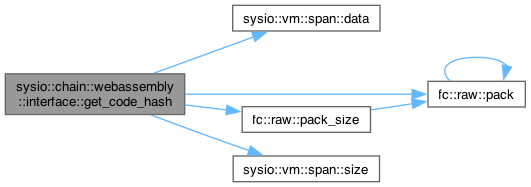
◆ get_context() [1/2]
|
inline |
Definition at line 17 of file interface.hpp.
◆ get_context() [2/2]
|
inline |
Definition at line 18 of file interface.hpp.
◆ get_context_free_data()
| int32_t sysio::chain::webassembly::interface::get_context_free_data | ( | uint32_t | index, |
| legacy_span< char > | buffer ) const |
Retrieve the signed_transaction.context_free_data[index].
- Parameters
-
index - the index of the context_free_data entry to retrieve. [out] buffer - output buffer of the context_free_data entry.
- Return values
-
-1 if the index is not valid. size of the cfd if the buffer is empty, otherwise return the amount of data copied onto the buffer.
Definition at line 5 of file context_free.cpp.
◆ get_parameters_packed()
| uint32_t sysio::chain::webassembly::interface::get_parameters_packed | ( | span< const char > | packed_parameter_ids, |
| span< char > | packed_parameters ) const |
Retrieve the blockchain config parameters. The input buffer is a packed data stream which represents an encoded sequence of parameter_id pairs with the following format: |varuint32:sequence_length | varuint32:parameter_id | ... The output buffer is a packed data stream which represents an encoded sequence of parameter_id:paramter_value pairs with the following format: |varuint32:sequence_length | varuint32:parameter_id | <various>:parameter_value | ... The encoding of parameter_values should be specific to the parameter being set The output buffer format should be valid input for set_parameters_packed. For each known parameter_id in the input sequence there should be an associated entry in the output sequence with the current encoded parameter_value.
- Parameters
-
packed_parameter_ids - the input buffer with the format as described above. [out] packed_parameters - the output buffer with the format as described above.
Definition at line 170 of file privileged.cpp.
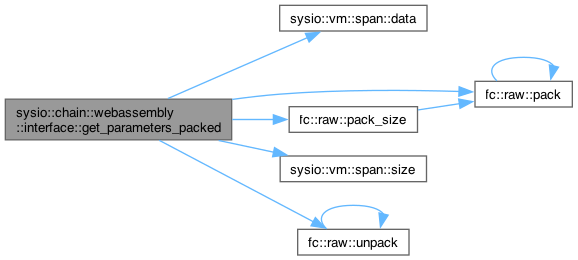
◆ get_permission_last_used()
| int64_t sysio::chain::webassembly::interface::get_permission_last_used | ( | account_name | account, |
| permission_name | permission ) const |
Returns the last used time of a permission.
- Parameters
-
account - the account owner of the permission. permission - the name of the permission.
- Returns
- the last used time (in microseconds since Unix epoch) of the permission.
Definition at line 78 of file permission.cpp.
◆ get_resource_limits()
| void sysio::chain::webassembly::interface::get_resource_limits | ( | account_name | account, |
| legacy_ptr< int64_t, 8 > | ram_bytes, | ||
| legacy_ptr< int64_t, 8 > | net_weight, | ||
| legacy_ptr< int64_t, 8 > | cpu_weight ) const |
Get the resource limits of an account
- Parameters
-
account - name of the account whose resource limit to get. [out] ram_bytes - output to hold retrieved ram limit in absolute bytes. [out] net_weight - output to hold net weight. [out] cpu_weight - output to hold cpu weight.
Definition at line 32 of file privileged.cpp.
◆ get_sender()
| name sysio::chain::webassembly::interface::get_sender | ( | ) | const |
Return the name of the account that sent the current inline action.
- Returns
- name of account that sent the current inline action (empty name if not called from inline action).
Definition at line 19 of file system.cpp.
◆ get_wasm_parameters_packed()
| uint32_t sysio::chain::webassembly::interface::get_wasm_parameters_packed | ( | span< char > | packed_parameters, |
| uint32_t | max_version ) const |
Get the current wasm limits configuration.
The structure of the parameters is as follows:
- max_mutable_global_bytes The maximum total size (in bytes) used for mutable globals. i32 and f32 consume 4 bytes and i64 and f64 consume 8 bytes. Const globals are not included in this count.
- max_table_elements The maximum number of elements of a table.
- max_section_elements The maximum number of elements in each section.
- max_linear_memory_init The size (in bytes) of the range of memory that may be initialized. Data segments may use the range [0, max_linear_memory_init).
- max_func_local_bytes The maximum total size (in bytes) used by parameters and local variables in a function.
- max_nested_structures The maximum nesting depth of structured control instructions. The function itself is included in this count.
- max_symbol_bytes The maximum size (in bytes) of names used for import and export.
- max_module_bytes The maximum total size (in bytes) of a wasm module.
- max_code_bytes The maximum size (in bytes) of each function body.
- max_pages The maximum number of 64 KiB pages of linear memory that a contract can use. Enforced when an action is executed. The initial size of linear memory is also checked at setcode.
- max_call_depth The maximum number of functions that may be on the stack. Enforced when an action is executed.
- Parameters
-
[out] packed_parameters the ouput for the parameters. max_version has no effect, but should be 0.
- Returns
- the size of the packed parameters if packed_parameters is empty, otherwise it returns the amount of data written in packed_parameters.
Definition at line 85 of file privileged.cpp.

◆ has_auth()
| bool sysio::chain::webassembly::interface::has_auth | ( | account_name | account | ) | const |
Test whether an account exists in the set of provided auths on an action.
- Parameters
-
account - name of the account to be tested.
- Return values
-
true if the action has an auth with the account name. false otherwise.
Definition at line 9 of file authorization.cpp.
◆ is_account()
| bool sysio::chain::webassembly::interface::is_account | ( | account_name | account | ) | const |
Verifies that n is an existing account.
- Parameters
-
account - name of the account to check.
- Returns
- true if the account exists.
- false otherwise.
Definition at line 22 of file authorization.cpp.
◆ is_feature_activated()
| bool sysio::chain::webassembly::interface::is_feature_activated | ( | legacy_ptr< const digest_type > | feature_digest | ) | const |
Check if specified protocol feature has been activated.
- Parameters
-
feature_digest - digest of the protocol feature.
- Return values
-
true if the specified protocol feature has been activated. false otherwise.
Definition at line 15 of file system.cpp.
◆ is_feature_active()
| int sysio::chain::webassembly::interface::is_feature_active | ( | int64_t | feature_name | ) | const |
Check if a feature is found on the activation set.
- Parameters
-
feature_name - 256-bit digest representing the feature to query.
- Returns
- false (deprecated)
Definition at line 13 of file privileged.cpp.
◆ is_privileged()
| bool sysio::chain::webassembly::interface::is_privileged | ( | account_name | account | ) | const |
Check if an account is privileged.
- Parameters
-
account - name of the account to be checked.
- Return values
-
true if the account is privileged false otherwise
Definition at line 205 of file privileged.cpp.


◆ k1_recover()
| int32_t sysio::chain::webassembly::interface::k1_recover | ( | span< const char > | signature, |
| span< const char > | digest, | ||
| span< char > | pub ) const |
Calculates the uncompressed public key used for a given signature on a given digest.
- Parameters
-
signatue - signature. digest - digest of the message that was signed. [out] pub - output buffer for the public key result.
- Returns
- -1 if there was an error 0 otherwise.
Definition at line 256 of file crypto.cpp.

◆ memcmp()
| int32_t sysio::chain::webassembly::interface::memcmp | ( | memcmp_params | args | ) | const |
◆ memcpy()
| void * sysio::chain::webassembly::interface::memcpy | ( | memcpy_params | args | ) | const |
Definition at line 4 of file memory.cpp.
◆ memmove()
| void * sysio::chain::webassembly::interface::memmove | ( | memcpy_params | args | ) | const |
Definition at line 11 of file memory.cpp.
◆ memset()
| void * sysio::chain::webassembly::interface::memset | ( | memset_params | args | ) | const |
Definition at line 22 of file memory.cpp.
◆ mod_exp()
| int32_t sysio::chain::webassembly::interface::mod_exp | ( | span< const char > | base, |
| span< const char > | exp, | ||
| span< const char > | modulus, | ||
| span< char > | out ) const |
Big integer modular exponentiation
<BASE> <EXPONENT> <MODULUS> returns an output (BASE**EXPONENT) % MODULUS as a byte array {{{{ with the same length as the modulus }}}}
- Parameters
-
base - a span containing BASE. exp - a span containing EXPONENT. modulus - a span containing MODULUS. [out] out - the result (BASE**EXPONENT) % MODULUS
- Returns
- -1 if there was an error 0 otherwise
Definition at line 167 of file crypto.cpp.
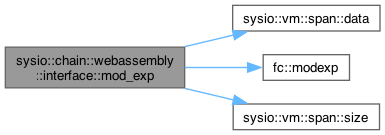
◆ preactivate_feature()
| void sysio::chain::webassembly::interface::preactivate_feature | ( | legacy_ptr< const digest_type > | feature_digest | ) |
Allows a privileged smart contract, e.g. the system contract, to pre-activate a consensus protocol upgrade feature.
- Parameters
-
feature_digest - 256-bit digest representing the feature to pre-activate.
Definition at line 19 of file privileged.cpp.
◆ printdf()
| void sysio::chain::webassembly::interface::printdf | ( | float64_t | val | ) |
Prints value as double-precision floating point number.
- Parameters
-
val - double-precision floating point number to be printed
Definition at line 86 of file console.cpp.

◆ printhex()
| void sysio::chain::webassembly::interface::printhex | ( | legacy_span< const char > | data | ) |
Prints a 64 bit names as base32 encoded string
- Parameters
-
data - Hex name to be printed.
Definition at line 136 of file console.cpp.

◆ printi()
| void sysio::chain::webassembly::interface::printi | ( | int64_t | val | ) |
Prints value as a 64 bit signed integer.
- Parameters
-
val - 64 bit signed integer to be printed.
Definition at line 25 of file console.cpp.
◆ printi128()
| void sysio::chain::webassembly::interface::printi128 | ( | legacy_ptr< const __int128 > | val | ) |
Prints value as a 128 bit signed integer.
- Parameters
-
val - 128 bit signed integer to be printed.
Definition at line 43 of file console.cpp.

◆ printn()
| void sysio::chain::webassembly::interface::printn | ( | name | value | ) |
Prints a 64 bit names as base32 encoded string.
- Parameters
-
value - 64 bit name to be printed
Definition at line 132 of file console.cpp.
◆ printqf()
| void sysio::chain::webassembly::interface::printqf | ( | legacy_ptr< const float128_t > | val | ) |
Prints value as quadruple-precision floating point number.
- Parameters
-
val - a pointer to the quadruple-precision floating point number to be printed
Definition at line 98 of file console.cpp.

◆ prints()
| void sysio::chain::webassembly::interface::prints | ( | null_terminated_ptr | str | ) |
Print a string.
- Parameters
-
str - the string to print
Definition at line 15 of file console.cpp.
◆ prints_l()
| void sysio::chain::webassembly::interface::prints_l | ( | legacy_span< const char > | str | ) |
◆ printsf()
| void sysio::chain::webassembly::interface::printsf | ( | float32_t | val | ) |
Prints value as single-precision floating point number.
- Parameters
-
val - single-precision floating point number to be printed.
Definition at line 74 of file console.cpp.

◆ printui()
| void sysio::chain::webassembly::interface::printui | ( | uint64_t | val | ) |
Prints value as a 64 bit unsigned integer.
- Parameters
-
val - 64 bit unsigned integer to be printed.
Definition at line 34 of file console.cpp.
◆ printui128()
| void sysio::chain::webassembly::interface::printui128 | ( | legacy_ptr< const unsigned __int128 > | val | ) |
Prints value as a 128 bit unsigned integer.
- Parameters
-
val - 128 bit unsigned integer to be printed.
Definition at line 66 of file console.cpp.
◆ publication_time()
| uint64_t sysio::chain::webassembly::interface::publication_time | ( | ) | const |
Returns the transaction's publication time.
- Returns
- time in microseconds from 1970 of the publication_time.
Definition at line 11 of file system.cpp.
◆ read_action_data()
| int32_t sysio::chain::webassembly::interface::read_action_data | ( | legacy_span< char > | memory | ) | const |
Copy up to length bytes of the current action data to the specified location.
- Parameters
-
memory - a pointer where up to length bytes of the current action data will be copied.
- Returns
- the number of bytes copied to msg, or number of bytes that can be copied if an empty span is passed.
Definition at line 6 of file action.cpp.
◆ read_transaction()
| int32_t sysio::chain::webassembly::interface::read_transaction | ( | legacy_span< char > | data | ) | const |
Access a copy of the currently executing transaction.
- Parameters
-
[out] data - the currently executing transaction (packed).
- Return values
-
false if transaction was not found. true if transaction was canceled.
Definition at line 6 of file cf_transaction.cpp.

◆ recover_key()
| int32_t sysio::chain::webassembly::interface::recover_key | ( | legacy_ptr< const fc::sha256 > | digest, |
| legacy_span< const char > | sig, | ||
| legacy_span< char > | pub ) const |
Calculates the public key used for a given signature on a given digest.
- Parameters
-
digest - digest of the message that was signed. sig - signature. [out] pub - output buffer for the public key result.
- Returns
- size of data written on the buffer.
Definition at line 47 of file crypto.cpp.

◆ require_auth()
| void sysio::chain::webassembly::interface::require_auth | ( | account_name | account | ) | const |
Verifies that an account exists in the set of provided auths on an action. Fails if not found.
- Parameters
-
account - the name of the account to be verified.
Definition at line 5 of file authorization.cpp.
◆ require_auth2()
| void sysio::chain::webassembly::interface::require_auth2 | ( | account_name | account, |
| permission_name | permission ) const |
Verifies that an account with a specific permission exists in the set of provided auths on an action,
- Parameters
-
account - the name of the account to be verified. permission - the name of the permission to be verified.
Definition at line 13 of file authorization.cpp.
◆ require_recipient()
| void sysio::chain::webassembly::interface::require_recipient | ( | account_name | recipient | ) |
Add the specified account to set of accounts to be notified.
- Parameters
-
recipient - account to be notified.
Definition at line 18 of file authorization.cpp.
◆ ripemd160()
| void sysio::chain::webassembly::interface::ripemd160 | ( | legacy_span< const char > | data, |
| legacy_ptr< fc::ripemd160 > | hash_val ) const |
Hashes data using RIPEMD160.
- Parameters
-
data - a span containing the data. [out] hash_val - computed digest.
Definition at line 115 of file crypto.cpp.
◆ send_context_free_inline()
| void sysio::chain::webassembly::interface::send_context_free_inline | ( | legacy_span< const char > | data | ) |
Send a context free inline action in the context of the parent transaction of this operation.
- Parameters
-
data - the packed free inline action to be sent.
Definition at line 16 of file transaction.cpp.

◆ send_deferred()
| void sysio::chain::webassembly::interface::send_deferred | ( | legacy_ptr< const uint128_t > | sender_id, |
| account_name | payer, | ||
| legacy_span< const char > | data, | ||
| uint32_t | replace_existing ) |
Send a deferred transaction.
- Parameters
-
sender_id - account name of the sender of this deferred transaction. payer - account name responsible for paying the RAM for this deferred transaction. data - the packed transaction to be deferred. replace_existing - if true, it will replace an existing transaction.
Definition at line 26 of file transaction.cpp.

◆ send_inline()
| void sysio::chain::webassembly::interface::send_inline | ( | legacy_span< const char > | data | ) |
Send an inline action in the context of the parent transaction of this operation.
- Parameters
-
data - the inline action to be sent.
Definition at line 6 of file transaction.cpp.

◆ set_action_return_value()
| void sysio::chain::webassembly::interface::set_action_return_value | ( | span< const char > | packed_blob | ) |
Sets a value (packed blob char array) to be included in the action receipt.
- Parameters
-
packed_blob - the packed blob
Definition at line 24 of file action.cpp.

◆ set_blockchain_parameters_packed()
| void sysio::chain::webassembly::interface::set_blockchain_parameters_packed | ( | legacy_span< const char > | packed_blockchain_parameters | ) |
Set the blockchain parameters.
- Parameters
-
packed_blockchain_parameters - a span containing the packed blockchain config parameters.
Definition at line 159 of file privileged.cpp.
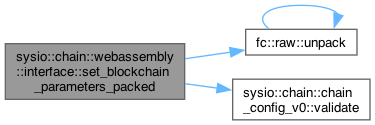
◆ set_parameters_packed()
| void sysio::chain::webassembly::interface::set_parameters_packed | ( | span< const char > | packed_parameters | ) |
Set the blockchain parameters. It allows a system contract the ability to set parameters in a flexible manner. The input buffer is a packed data stream which represents an encoded sequence of parameter_id:paramter_value pairs with the following format: |varuint32:sequence_length | varuint32:parameter_id | <various>:parameter_value | ... The encoding of parameter_values should be specific to the parameter being set. Having duplicate parameter_ids encoded in the sequence should result in aborting the transaction context. The presence of a parameter_id which is unknown OR which is known but tied to an unactivated consensus protocol should result in aborting the transaction context. There are no requirement for the ordering of items in the sequence.
- Parameters
-
packed_parameters - buffer to hold the packed data with the format described above.
Definition at line 190 of file privileged.cpp.
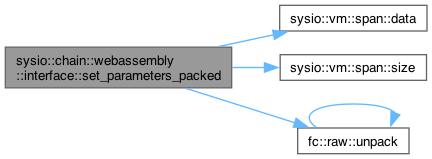
◆ set_privileged()
| void sysio::chain::webassembly::interface::set_privileged | ( | account_name | account, |
| bool | is_priv ) |
Set the privileged status of an account.
- Parameters
-
account - name of the account that we want to give the privileged status. is_priv - privileged status (true or false).
Definition at line 209 of file privileged.cpp.
◆ set_proposed_producers()
| int64_t sysio::chain::webassembly::interface::set_proposed_producers | ( | legacy_span< const char > | packed_producer_schedule | ) |
Proposes a schedule change using the legacy producer key format.
- Parameters
-
packed_producer_schedule - vector of producer keys
- Returns
- -1 if proposing a new producer schedule was unsuccessful, otherwise returns the version of the new proposed schedule.
Definition at line 115 of file privileged.cpp.


◆ set_proposed_producers_ex()
| int64_t sysio::chain::webassembly::interface::set_proposed_producers_ex | ( | uint64_t | packed_producer_format, |
| legacy_span< const char > | packed_producer_schedule ) |
Proposes a schedule change with extended features.
Valid formats: 0 : serialized array of producer_keys. Using this format is exactly equivalent to set_proposed_producers. 1 : serialized array of producer_authority's.
- Parameters
-
packed_producer_format - format of the producer data blob. packed_producer_schedule - packed data of representing the producer schedule in the format indicated.
- Returns
- -1 if proposing a new producer schedule was unsuccessful, otherwise returns the version of the new proposed schedule.
Definition at line 131 of file privileged.cpp.

◆ set_resource_limits()
| void sysio::chain::webassembly::interface::set_resource_limits | ( | account_name | account, |
| int64_t | ram_bytes, | ||
| int64_t | net_weight, | ||
| int64_t | cpu_weight ) |
Set the resource limits of an account.
- Parameters
-
account - name of the account whose resource limit to be set. ram_bytes - ram limit in absolute bytes. net_weight - fractionally proportionate net limit of available resources based on (weight / total_weight_of_all_accounts). cpu_weight - fractionally proportionate cpu limit of available resources based on (weight / total_weight_of_all_accounts).
Definition at line 23 of file privileged.cpp.
◆ set_wasm_parameters_packed()
| void sysio::chain::webassembly::interface::set_wasm_parameters_packed | ( | span< const char > | packed_parameters | ) |
Set the configuration for wasm limits.
See get_wasm_parameters_packed documentation for more details on the structure of the packed_parameters.
- Parameters
-
packed_parameters - a span containing the packed configuration to set.
Definition at line 101 of file privileged.cpp.
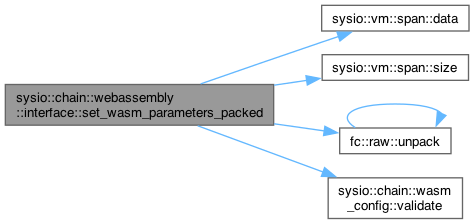
◆ sha1()
| void sysio::chain::webassembly::interface::sha1 | ( | legacy_span< const char > | data, |
| legacy_ptr< fc::sha1 > | hash_val ) const |
Hashes data using SHA1.
- Parameters
-
data - a span containing the data. [out] hash_val - the resulting digest.
Definition at line 103 of file crypto.cpp.
◆ sha256()
| void sysio::chain::webassembly::interface::sha256 | ( | legacy_span< const char > | data, |
| legacy_ptr< fc::sha256 > | hash_val ) const |
Hashes data using SHA256.
- Parameters
-
data - a span containing the data. [out] hash_val - the resulting digest.
Definition at line 107 of file crypto.cpp.
◆ sha3()
| void sysio::chain::webassembly::interface::sha3 | ( | span< const char > | data, |
| span< char > | hash_val, | ||
| int32_t | keccak ) const |
Hashes data using SHA3.
- Parameters
-
data - a span containing the data. [out] hash_val - the resulting digest. keccak - use keccak version (1-true, all other values == false).
Definition at line 237 of file crypto.cpp.
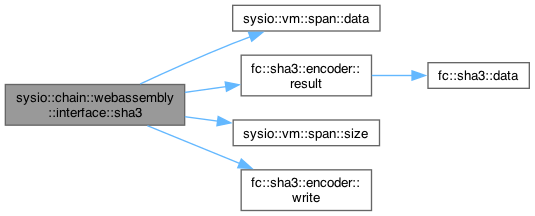
◆ sha512()
| void sysio::chain::webassembly::interface::sha512 | ( | legacy_span< const char > | data, |
| legacy_ptr< fc::sha512 > | hash_val ) const |
Hashes data using SHA512.
- Parameters
-
data - a span containing the data. [out] hash_val - the hash
Definition at line 111 of file crypto.cpp.
◆ sysio_assert()
| void sysio::chain::webassembly::interface::sysio_assert | ( | bool | condition, |
| null_terminated_ptr | msg ) const |
Aborts processing of this action if the test condition is false.
- Parameters
-
condition - test condition. msg - string explaining the reason for failure.
Definition at line 10 of file cf_system.cpp.

◆ sysio_assert_code()
| void sysio::chain::webassembly::interface::sysio_assert_code | ( | bool | condition, |
| uint64_t | error_code ) const |
Aborts processing of this action if the test condition is false. It can be used to provide an error code rather than a message string on assertion checks. If the assertion fails, the provided error code will be made available through the exception message.
- Parameters
-
condition - test condition. error_code - the error code associated.
Definition at line 26 of file cf_system.cpp.
◆ sysio_assert_message()
| void sysio::chain::webassembly::interface::sysio_assert_message | ( | bool | condition, |
| legacy_span< const char > | msg ) const |
Aborts processing of this action if the test condition is false.
- Parameters
-
condition - test condition. msg - string explaining the reason for failure.
Definition at line 18 of file cf_system.cpp.
◆ sysio_exit()
| void sysio::chain::webassembly::interface::sysio_exit | ( | int32_t | code | ) | const |
This method will abort execution of wasm without failing the contract.
- Parameters
-
code - the exit code
Definition at line 48 of file cf_system.cpp.
◆ tapos_block_num()
| int32_t sysio::chain::webassembly::interface::tapos_block_num | ( | ) | const |
Gets the block number used for TAPOS on the currently executing transaction.
- Returns
- block number used for TAPOS on the currently executing transaction.
Definition at line 28 of file cf_transaction.cpp.
◆ tapos_block_prefix()
| int32_t sysio::chain::webassembly::interface::tapos_block_prefix | ( | ) | const |
Gets the block prefix used for TAPOS on the currently executing transaction.
- Returns
- block prefix used for TAPOS on the currently executing transaction.
Definition at line 32 of file cf_transaction.cpp.
◆ transaction_size()
| int32_t sysio::chain::webassembly::interface::transaction_size | ( | ) | const |
Gets the size of the currently executing transaction.
- Returns
- size of the currently executing transaction.
Definition at line 19 of file cf_transaction.cpp.


The documentation for this class was generated from the following files:
- libraries/chain/include/sysio/chain/webassembly/interface.hpp
- libraries/chain/webassembly/action.cpp
- libraries/chain/webassembly/authorization.cpp
- libraries/chain/webassembly/cf_system.cpp
- libraries/chain/webassembly/cf_transaction.cpp
- libraries/chain/webassembly/compiler_builtins.cpp
- libraries/chain/webassembly/console.cpp
- libraries/chain/webassembly/context_free.cpp
- libraries/chain/webassembly/crypto.cpp
- libraries/chain/webassembly/database.cpp
- libraries/chain/webassembly/memory.cpp
- libraries/chain/webassembly/permission.cpp
- libraries/chain/webassembly/privileged.cpp
- libraries/chain/webassembly/producer.cpp
- libraries/chain/webassembly/softfloat.cpp
- libraries/chain/webassembly/system.cpp
- libraries/chain/webassembly/transaction.cpp


